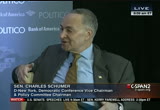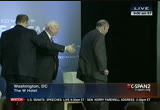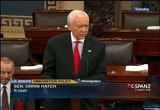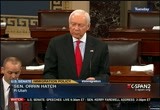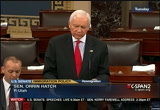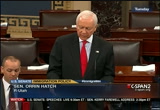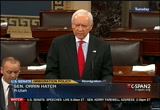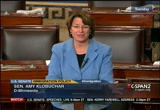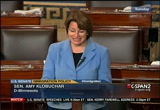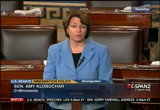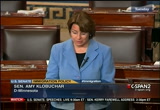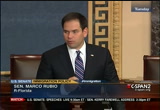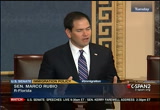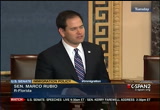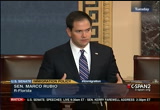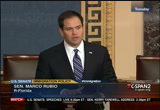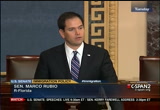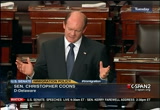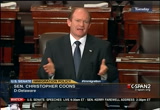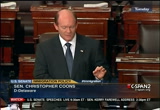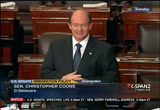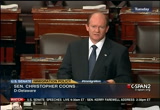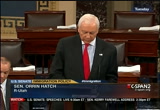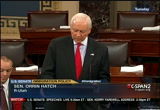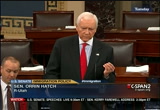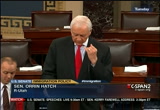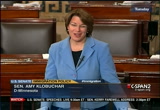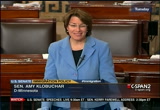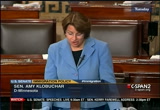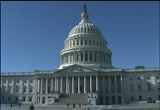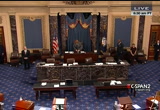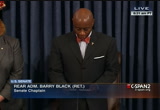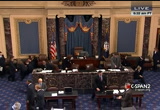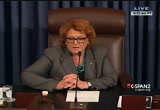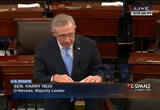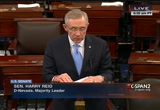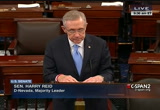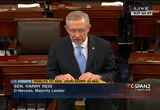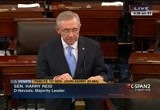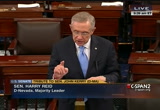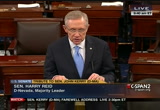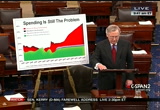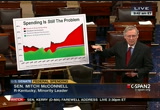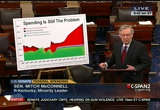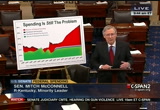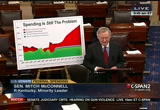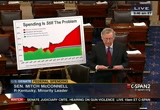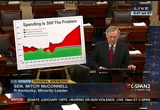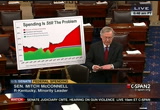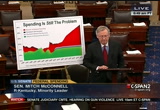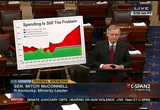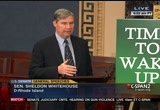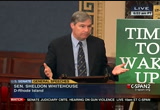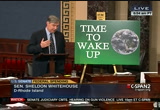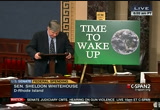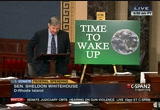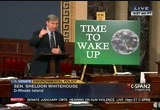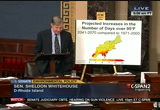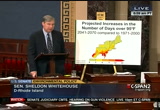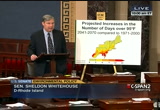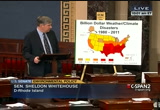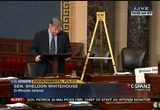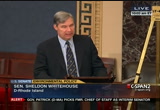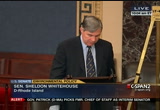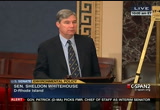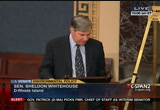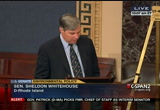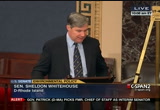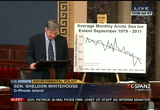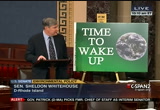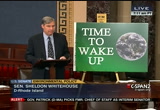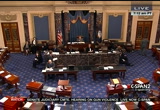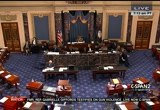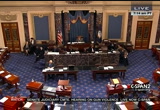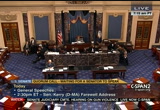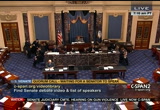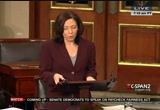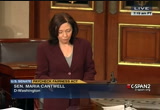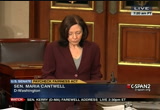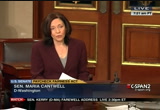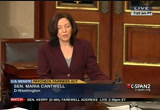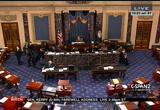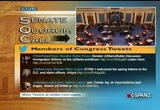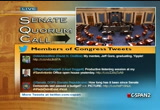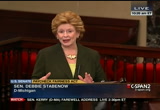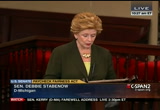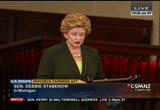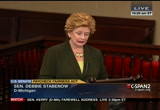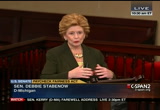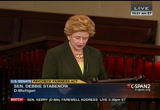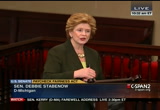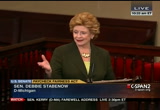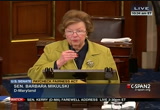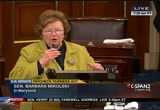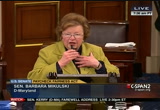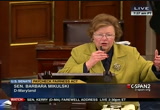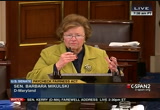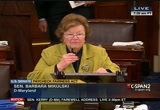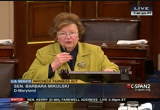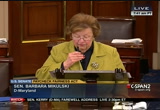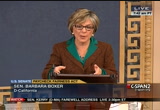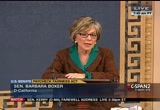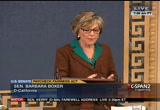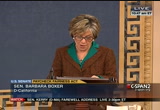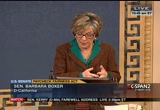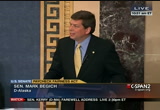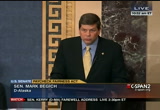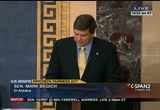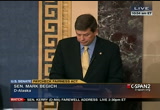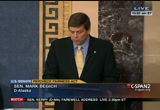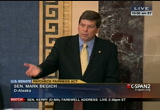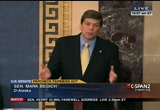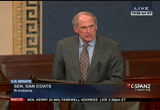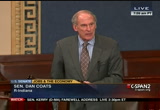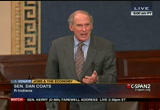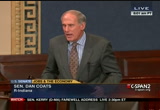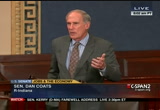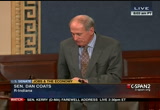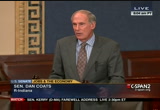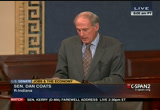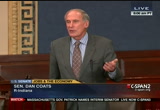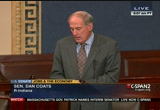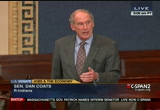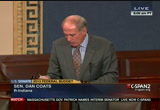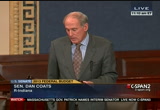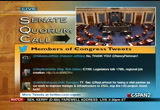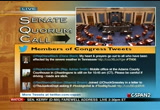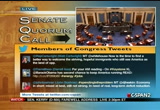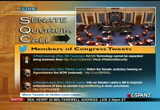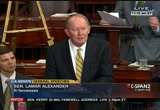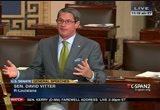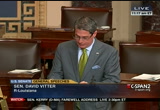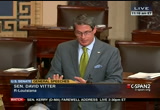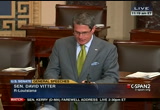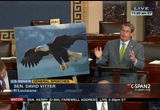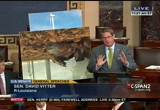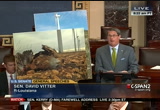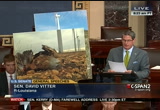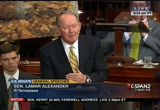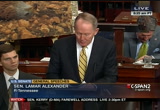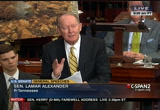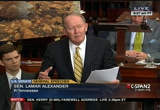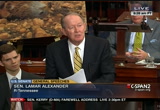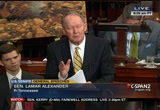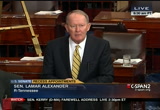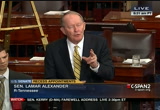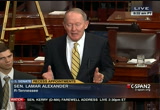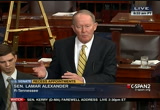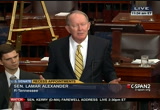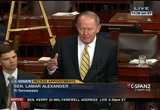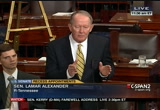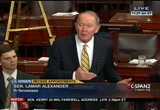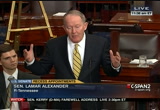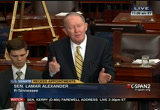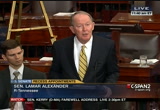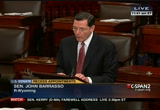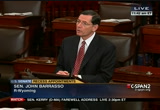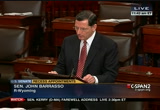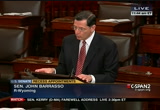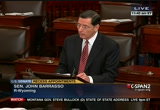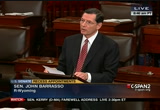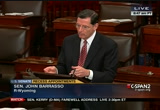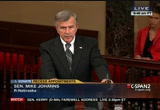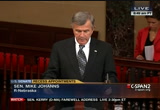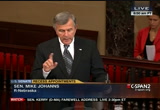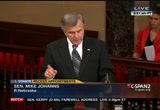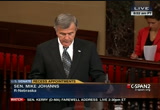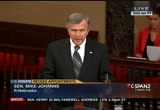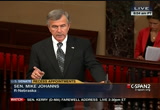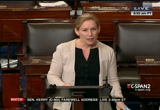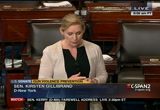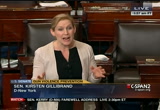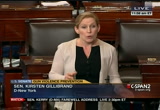tv U.S. Senate CSPAN January 30, 2013 9:00am-12:00pm EST
9:00 am
beyoncé apologize? and i said no. and the headline said schumer a apologize is -- demands apology from beyoncé. [laughter] >> you have a score for? >> the ravens by 4. >> thanks all of you -- >> from new jersey. almost new york. [laughter] >> that's sufficient reason. >> i think all of you are watching. i think my political college to make this event possible. thank all of you for coming out so early. thank bank of america for making fantastic conversation possible, i think it's senator schumer, senator mccain, for a fantastic conversation. thank you all. [applause]
9:01 am
>> [inaudible conversations] wrapping up this one with senators mccain and schumer. if you missed any of the remarks you can see it in its entirety at c-span.org. the u.s. senate is about to gavel and this morning at 9:30 a.m. the chamber will be in mourning business until about 11:30. later at 2:30 p.m. chair of the foreign relations committee senator john kerry will be delivered his farewell address. yesterday he was confirmed in full sent to be secretary of state. that vote was 94-3. he could be sworn in as early as friday which was within the secretary hillary clinton's last day on the job. yesterday on the senate floor, a five person group of lawmakers
9:02 am
including florida's marco rubio, senators hatch and global part -- the bill called the immigration innovation would increase the number of science engineering technology and math degrees. we will show you some of that debate into the senate gallows and at 9:30 a.m. >> senator from utah. >> i rise today to introduce the immigration innovation or i squared act of 2014. i'm pleased to be joined here by my colleagues, senator amy klobuchar, senator marco rubio, and senator chris coons, without whom this bill would not have materialized. all four of us have worked very closely together and each one deserves total credit for this bill. together, we have crafted one of the first bipartisan immigration bills this congress. one that is designed to address
9:03 am
the shortage of high skilled labor that we face in this country. this shortage has reached a crisis level. for too long our country has been unable to meet the ever-increasing demand for workers trained in the science, technology, engineering and math, or stem fields. as a result some of our nation's top technology markets like silicon valley, seattle, boston, new york and salt lake city are in desperate need for qualified skin workers. it is critical that we not only recognize this shortage of high skilled workers, but also understand why it exists. increasingly enrollment in u.s. universities in the s.t.e.m. fields come from foreign students and despite our urgent need for workers in these fields, we continue to send these foreign students potential high skilled workers trained in american universities back to their home countries after graduation. just recently i was in a meeting with several leaders in the
9:04 am
technology industry where it was mentioned that between 2010 2010-2020, the american economy will annually create more than 120,000 additional computer or science jobs that were require at least a bachelors degree. that's just mention one aspect of this. this is great news for many of our computer science students. and for joy that is the end of the good news. each year only about 40,000 american students receive bachelor degrees in computer science. in other words, there are approximately 80,000 new computer science positions every year in the united states cannot be filled by available american workforce positions. and i have positions that need to be filled so that our technology industry can continue to thrive. simply put, u.s. based companies have a great need for those trained in the science,
9:05 am
technology, engineering and math fields. but at least right now there are not enough americans trained and ready to fill these jobs. we cannot continue to simply hope that american companies do not move operations to countries where they have greater access for individuals trained in these s.t.e.m. fields. we cannot continue to ignore this problem. it's that simple. continued in action -- especially since the american enterprise institute has confirmed 100 foreign-born workers with s.t.e.m. degrees create an average of 262 additional jobs for nativeborn workers. let me tell you, these countries would love to have the american educated ph.d's and other highly educated individuals return and boost their economies. not only from their acquired
9:06 am
skills, but also by creating these new jobs as well. an updated high skilled immigration system is directly tied to creating jobs and spurring growth across all sectors of our economy. we cannot afford any further inaction on this issue. the i squared act of 2013 addresses that you meet short-term need to provide american employers with greater access to high skilled workers while also addressing the long-term need to invest in america's s.t.e.m. education. i'm confident that this two-step approach will enable our country to thrive and help us compete in today's global economy. now, i have mentioned my three prime cosponsors on this bill. each one of them deserves credit for this bill. each one of them has been a pleasure to work with.
9:07 am
i want to personally thank them for working with me on this issue and allowing me the privilege working with them on this issue. let me turn sometime over to senator klobuchar who, along with senator coons and rubio have been prime movers on this piece of legislation. >> thank you to much, senator hatch, and it is good to be here with our strong cosponsors -- senator rubio and senator coons, and i want to thank you for your incredible leadership. we have worked as a team and i think this really is about what this is. it is a team, team america, because we love to be a country that makes stuff again, that invents things, that exports to the world. and to do that we need the world's talent that that is what this bill is about. as everyone can see by looking at the floor, it's something of both parties can agree on. to get this done and take a
9:08 am
comprehensive immigration reform done, we must work in a bipartisan manner. i support the principles outlined yesterday for reform, and look forward to working with my colleagues on the judiciary committee to get this done. the i-squared act bill is about encouraging engineers and inventors and innovators and entrepreneurs to work here in this country and to actually discourage companies from contracting out with people in other country. i can't tell you how many minnesota companies, small companies have told me that they couldn't bring someone over because of the cap, and they contracted with this person in another country. guess what, that person been hired an assistant and other people to work with them. in one case they hired 20 people instead of hiring americans. in fact, a recent study headed by mayor bloomberg of new york, mayor castro of san antonio, mayor nutter of philadelphia, and others, showed that for every h-1b when these come it
9:09 am
creates 1.8 american jobs but those are jobs in july, jobs in minnesota. take a look at the fortune five an companies. 90 of those companies were founded by immigrants in over 200 were founded by immigrants or their children, including electronic and 3m in my home state. this is meant an extraordinary number of good american jobs, and we want more. we want the next peacemakepeacemake r or post-it note, which were invented in my state, to be invented again in the united states of america. i want to quickly lay out the four areas of reform that are included in the i-squared bill. first of all we reform the h-1b when visa system to meet the needs of a growing science and, in jenin, tech and medical community. and to help the workers who form the backbone of those businesses. second, we make changes to student visas to encourage students to get degrees here to stay in this country.
9:10 am
so that we don't just say hey, go back to india or china or some other country and start the next google over the. we want it started to third, we improve the green card system, if i was one of the most important things in this bill, we actually change the visa funding structure so that companies who bring in these high-tech in science and engineering immigrant workers will also be spending some money on funding, all of the education efforts we need to do in this country for science engineering technology and math. the s.t.e.m. education that is going on in this country. but even a conservative estimate that would be 300 million a year, something like $3 billion in 10 years. either a precious of the work of my college and i'm not senator rubio who is shown great leadership on this issue is next going to talk about the h-1b and student visa reforms come and get i want to thank him, senator
9:11 am
hatch, senator coons for the leadership on this issue. we are excited about moving ahead with this bill. >> thank you, senator -- i want to get my microphone fixed it the first time i speak from this desk. thank you, mr. president. a couple things, there's been a lot in the news over the last 24 hours about immigration as an issue that confronts a country i wanted to put this in the context of that and then talk specifically about the details that are within this. in the context of immigration reform, there are things i think the passengers of americans would agree and one of them is this that we have a legal immigration system which is not working for the country. i think despite the basics, and how to do without reality and that's a real debate that needs to happen, one of the things everyone agrees on is that legal immigration is good for this country, it's been an important part of our history. it's a critical part of our future. the legal immigration system that we have in place right now does not work for america, and it really does the work for the 21st century. at me be clear about one thing.
9:12 am
i support family-based immigration. that's how my parents came to this country. i do want to see anything under my to buy also know in the 21st century we can no longer afford to have an immigration system where literally only less than 10% of the people who come here do so based on the skills that they bring to this country. think about this for a moment. if i said to you that the united states of america, the nba should be a collection of the best basketball players in the world, who would disagree with that? if i said that major league baseball should be a selection of the best baseball players in the world, who would disagree with that? how then can we disagree about that when it comes to our economy? that the smartest, hardest working, most talented people on this planet, we should want him to come here. i, for one, have noted that our country will be overrun by ph.d's. i, for one, have no for this country will be overrun by nuclear physicist. and onto partners. now, we have to create a system where that can happen. in a rational, organized and
9:13 am
legal way. that's what we are attempting to do. because that is not what we have right now in the united states. what we have, in fact, is a system and senate discuss, it's startling when i heard this. the nation has a demand nearly for 120,000 computer science engineers, but our universities only produce 40,000 people. this is an indictment of our educational system. we need to fix that. we need to get to a point in this country where we have 120,000 people graduating to meet the demand. but in the short term right now we have to deal with the fact that of those 80,000 jobs, those 80,000 graduates are not created here, those jobs are still going to exist. they're just not going to exist here. these companies are not going to wait for us to produce more graduates. these companies are not going to wait for us to fix our immigration system. they have a business to run and if they can't find the people they need to fill these jobs, they will just send those jobs to another country. let me to you what that means in
9:14 am
practical terms. the high-paying jobs in these industries will be paying the taxes to some other country, will be simply an economy and some of the country. you want to know what america is special? one of the reasons why it special is because for over 200 years we have been a collection of the world's best and brightest to a magnet that attracts people here and now have an immigration system in the 21st century that is making a very difficult to achieve. that's what this effort is to the other concern i heard is what about folks that are in this country now? this is a legitimate concern when people raise it, i don't get upset about that. that is a very legitimate concern. about the kids are raised here and go into these intricate, will they be hurt if you have seen the need, they need far exceeds what we are producing. so that's not an immediate concern but here's the other. that is the startling figure that was used earlier. that for every 100, 100
9:15 am
foreign-born s.t.e.m. workers we're creating 260 some odd jobs. it's indisputable that these jobs create jobs for people right down the line in this process. if you're an entrepreneur as an immigrant you can create jobs for all kinds of people and most of them are born you. if you great new technology or develop new technology, you create jobs and opportunities for people who live here, work your or were born here. this is a net positive for our economy. that's why this issue is so critical that it be confronted. as we talk about needing to deal with our entire immigration system we can modernize america's legal immigration system if we don't have a way to get the world's best and brightest to come here. and a way that is expedient and that is cost effective than the way that is safe and in a way that is legal. that's what we are attempting to do. this bill is not in competition with any other effort. it complements. it's an indispensable part of it. you cannot comprehensively reform america's illegal immigration system if it does
9:16 am
not include visa provisions, or grudges and science, technology, engineering and math. my final point. it makes no sense to invite people to come to the united states to study at our universities, to become the best and brightest in the world at the subject matter, and then to ask them to leave. think about that for a moment. we tell you come to america, we will let you go to our best schools, we will teach you everything we know, and then we want you to go somewhere else and use the knowledge that you gain here. that's crazy. that's in matches nonsensical, it's crazy. we can't keep doing that. and hopefully we begin to change it here now. it's been a pleasure to work with all the folks involved. senator hatch's leadership has been extorted. with a really good group working here. our final college has been a part of this them an indispensable one or we worked on this issue in the context of another piece of legislation which we hope will get moving
9:17 am
soon. senator coons, my colleague from delaware and we are interested in hearing from him about this issue as well. >> thank you, senator rubio. i greatly appreciate the opportunity work with you on this legislation. and in the last congress on the more than three bills that we cosponsor. they would focus on how to create jobs and how to drive our economy forward. senator hatch, i'm grateful for your leadership. senator klobuchar, for your companionship as we start to get on the judiciary committee and that's the fourth was introduced today this bill of which we are so proud to immigration innovation act of 2013. mr. president, for decades the united states enjoyed a commanding advantage of being home to all the world's top universities, particularly in science, technology, engineering and math, in the so-called s.t.e.m. fields. and we were the best place for the graduates of those universities and other advanced science programs to stay and launch a new business.
9:18 am
but today, that field has changed. and our competitors are vying to provide more supportive environments for innovators, inventions, and started countries. there has been a seachange in the field of opportunity back home for those foreign nationals who in increasing members are educated in the united states and who we've been forced to return to the nation of origin. so even though many of the most talented young people from around the globe still pour into the united states to obtain their masters or doctoral degrees in the s.t.e.m., now more than ever, they are not just tempted to take their education home with them and start businesses elsewhere, they are attracted by their own country and forced to our outdated immigration system. what an unwise way to compete in the global economy. our outdated immigration system hasn't adapted for the modern world. half of all masters and doctoral degrees in s.t.e.m. fields at american universities are today earned by foreign-born students who then face an uncertain
9:19 am
expensive than unwieldy path to pursuing their dreams in the united states. our country is hemorrhaging innovation, and the inventors who make it, and the jobs that come with them. because america's immigration laws have failed to keep up with the demands of the modern age. we cannot afford to keep educating the world's brightest students at our leading universities, which i were remind you are subsidized by u.s. tax dollars and american charitable giving. and then telling them they cannot repay those investments by contributing to the u.s. workforce. is both bad policy and bad business. that's what i've been working on this issue since i rise in the senate introducing three bills in calling for the creation of a new class of green cards for immigrants to earn an advanced student agree from an american university. i was glad to see the bipartisan framework released yesterday by senators mccain, schumer, rubio, and others, which moves us towards comprehensive immigration reform, embraces of this vital core principle.
9:20 am
i also welcome president obama's contributions to this discussion and look forward to hearing what he has to say today in las vegas. it carries a bipartisan agreement that it is -- to make room for foreign-born american educated experts who want to apply their skills, start businesses and raise their families are. at the same time went to dramatically improve s.t.e.m. education available to american citizens to fill this dramatic gap in these fields. as senator hatch said just a few minutes ago, if you take the example of computer science, by 2020 the u.s. economy will need 120,000 men and women to fill these jobs, yet just 40,000 graduates with degrees in computer science will be americans. how to fill that gap so the bipartisan legislation we introduced today tackles old site of this problem by reforming our outdated immigration system to allow highly skilled engineers and researchers to stay here rather
9:21 am
than leaving and taking their jobs and future opportunities with of them, and by funneling the hundreds of names of dollars of fees, these experts pay to the green card, back into improving us-based s.t.e.m. education. it's a win-win. the immigration innovation act of 2013 will open the door, would recapture unused green cards and will move away from the outdated model of country caps and overall caps. to better compete with countries like our neighbors to the north and candidate with these cats don't exist and microsoft is eager to open a new nasa develop a facility at our expense and loss. one of the most important parts of this legislation as i mentioned is that we are using fees from the newly expanded h-1b1 visas and green cards difference to initiative on standard this will keep america at the cutting edge of science and technology and fuel economic growth for this country and generations to come. while each of the co-authors of this legislation have a substantial contribution, i'm
9:22 am
especially grateful to senator hatch of utah for his leadership of senator hatch, which itself a little bit more about this legislation? >> thank you, mr. koontz. >> senator from utah. >> i want to thank you, senator coons and senator klobuchar and senator rubio here as you can see, it's a real pleasure to work with these three partners. and others as well that will remain here before we're through here today. i particularly want to thank you for the overview you have given on this bill. it's been a real pleasure for me to work with you three very innovative leaders in the sena senate. but as a number of you have mentioned by eliminating country limits for employment place of green card, recapturing lost employment base immigrant visas, exempting certain classes of immigrants from the annual green card limit and creating a new and sustainable funding stream
9:23 am
to enhance of the u.s. s.t.e.m. education pipeline, we will help america's innovative industries preclude and retain highly skilled talent and more effectively compete in today's global marketplace and it will make us more competitive. stakeholder support the i-squared act of 2013. today, we have received letters of support from the following, these are supporters of this bill. microsoft, oracle, intel, ibm, hewlett-packard companies, facebook, texas instruments, qualcomm, u.s. chamber of commerce, national association of manufacturers, bfa, the software alliance, compete america, silicon -- technet, the technology association of america, the consumer electronics association, the software information industry association, the internet association, the computer and
9:24 am
communications industry association, the information technology industry council, the information technology and innovation foundation, texter alliance, the association for an additive technology, the telecommunications industry association, ctia, the wireless association, sabre holdings, the council of school officers, and just to mention one other, immigration voice. mr. president, i asking in this consent of these letters from each of these companies and organizations be inserted into the congressional record at this point. >> without objection, so ordered. >> working with senators klobuchar, rubio and tunes, i have to say it's a real privilege for me, these are really three very fine --
9:25 am
senator rubio in my view is one of the most knowledgeable senators we have on immigration policy, and as you can see a terrific leader in so many other ways. we send a strong message that both sides of the aisle can come together to craft bipartisan legislation to address one of our country's most urgent economic needs. yesterday, eight of our colleagues unveiled the framework to overhaul our nation's immigration system. i'm proud of them. i commend them for their willingness to work in a bipartisan way to reform our immigration laws, which is very much needed. and one of the leaders is of course our own senator rubio, as well as senator schuman testing sender making, and others as well that he did not mention but i think you get the point. similarly, the work of senators klobuchar, rubio, cones, and i've done in crafting the i-squared act of 2013 was no easy task and represents hours of negotiations with interested
9:26 am
stakeholders and has garnered as you can see widespread industry support. the i scored at makes sense. i hope that our language to reform the high skilled immigration system is considered by this body in the immediate future. i would sure like you're a little more from senator of which are if she would care to make some additional points on that spent thank you, mr. president. >> senator coons. >> thank you for those kind words, senator hatch, and i wanted to follow up from senator rubio's analogy on the sports because i did notice he mentioned basketball and baseball, but not hockey. and as you know minnesota is the state of hockey. in fact, we just a very happy that the nhl is back playing again and that our team, the
9:27 am
wild, is going. i look at some of the numbers senator rubio was talking about, and, in fact, significant number of our players on our professional hockey team come from of the country but as you know there's a lot of canadian hockey but and there are place all over the world in all of these sports. and you wonder, why is that? with all the talk about immigration backlogs and the visa shortages, you wonder how all these great athletes are contributing to our teams. the answer is, is there is no cap on visas to athletes. again, there is no limit on how many athletes can come over and play on our sports teams. as a result athletes from across the globe can compete here and we have the best sports leagues in the world. why shouldn't we apply the same principles to engineering, the innovation, science, and medical development? that's what we should be doing. in this bill we do have some caps. we are raising those caps because we think it is time to
9:28 am
compete with the rest of the world. immigrants have always laid a crucial role in these disciplines in the u.s. but, in fact, and this was an interesting statistic we got. the u.s u.s. nobel prize winner, u.s. nobel prize winner, 30% of them, senator hatch, have been immigrants. 30% of them. one of those was mario, he was born in italy in 1937. his mother survived a nazi concentration camp and was eventually able to bring into the u.s. in 2007. he won the nobel prize in medicine for his work on altering genes in mice in the use of s.t.e.m. cells. this is an exciting area of work that gives us great hope to solve many diseases. medtronic am a minnesota institution that has pioneered medical devices for years, started in a garage started by the child of an immigrant. so why would we want to prevent the next person who would come in who could cure cancer, who
9:29 am
could create a new energy source, who would bring in new means of communication to our country? this bill is about moving our country forward. this bill is about competing in the world economy, and if i can do it in baseball and basketball, and i would add, senator rubio, hockey, we can do it in engineering science technology and math. and so i thank my colleagues and turn it over to senator rubio. >> just let the record reflect -- >> ththey will begin debate with the general speeches until about 11:30 a.m. eastern this afternoon at 2:30 p.m. massachusetts senator john kerry will give his farewell address. yesterday his colleagues confirmed him to be the next secretary of state by a vote of 94-3. he could be sworn in as early as friday which be secretary clinton's last day on the job. we are just funny how you can also see a bipartisan gun safety
9:30 am
9:31 am
gracious father, your loving kindness and faithfulness drew us to you, for you deserve our complete trust and allegiance. thank you for giving us so much more than we deserve in blessings. and withholding what we zev for our trans-- what we zev for our transgressions. lord, work through our haw makers today, making them your partners in solving the problems that confront our nation. may they do justly, love mercy and walk humbly with you. tune their minds to the frequency of your guidance, surpassing human understanding with the gift of your knowledge. when trying times provoke doubts
9:32 am
and anxieties, remind them that you hold the future in your hands. we pray in your sacred name. amen. the presiding officer: please join me in reciting the pledge of allegiance to the flag. i pledge allegiance to the flag of the united states of america and to the republic for which it stands, one nation under god, indivisible, with liberty and justice for all. the presiding officer: the clerk will read a communication to the senate. the clerk: washington, d.c, january 30, 2013. to the senate: under the provisions of rule 1,
9:33 am
paragraph 3, of the standing rules of the senate, i hereby appoint the honorable heidi heitkamp, a senator from the state of north dakota, to perform the duties of the chai. signed: patrick j. leahy, president pro tempore. the presiding officer: the majority leader. mr. reid: following leader remarks, the senate will be in a period of morning business for two hours. the majority will control the first hark the republicans the second half. at 2:30 today, senator kerry will be recognize the to deliver his farewell remarks. we hope to complete action on the debt limit negotiation -- debt limit legislation very soon. i'm told that s. 177 is at the desk and due for a second reading. is that correct, madam president in. the presiding officer: that is correct. the clerk will read the title of the bill for the second time. the clerk: s. 177, a bill to repeal the patient protection and affordable care act and the health care and education reconciliation act of 2010
9:34 am
entirely. mr. reid: madam president, i would to be any further proceedings with respect to this bill. the presiding officer: objection having been heard, the bill will be placed on the calendar. mr. reid: madam president, i rise today to honor john kerry, our colleague, th the senator fm -- the senator from massachusetts. i congratulate him on his appointment as the next secretary of state. he will be missed by his senate colleagues, that's for sure. senator kerry said at his confirmation hearing that the senate is in his blood, and that is true. as he represents america's interests around the world, his experience as a united states senator will serve him and our country well. for 28 years senator kerry has been a dedicated representative of the people of massachusetts. he as also delivered
9:35 am
distinguished service to his country in the navy and the democratic party and the people of this country as the 2004 presidential nominee for the democratic party. he is really a brilliant man. he was a debater at yale and won awards for his skilled oratory. before he graduated college, he was a local critic of the vietnam war. upon graduation, senator kerry volunteered to serve in the united states navy, and serve he did. later he said, "did i it because it was the right thing to do." senator kerry learned the value of service at home. his father was a foreign service officer. his mother a nurse during world war ii. he served two tours as a navy lieutenant in the jungles and rivers in vietnam. he was awarded the silver star for his gallantry, a bronze star
9:36 am
for valor also, and three purple hearts. but even after his service in the war, his opposition continued. on april 22, 1971, senator kerry became the first vietnam veteran to testify before congress about the war, when he appeared before the senate foreign relations committee, which was chaired by the famous senator fulbright, a committee that he would later chair, it was a remarkable appearance. ihe was the first veteran to testify. he went on to attend boston college school of law. he worked as a prosecutor in middlesex county before elected to lieutenant governor in 1982. but just two years later he was elected to the united states senate. he served in the senate for five
9:37 am
terms. he's had -- he's always been an unflinching advocate for veterans. he helped found the vietnam veterans for america. he's helped to secure treatment for service members dealing with post-traumatic stress disorder. he's deserved six years in the senate intelligence committee and 28 years on the foreign relations committee. he's been a leading advocate of doing something about global climate change. senator kerry has convened eight major hearings and round tables on the one hand climate change since taking the gavel as chair of the foreign relations committee, replacing vice president biden. it was in the early 1990's that senator kerry's brilliant mind and exceptional dedication came to my attention. i had the good fortune of being chosen by leader mitchell to be a member of the collect select e
9:38 am
on p.o.w.-mia. it was the believe of many that there were live americans either in cambodia, laos, many in vietnam. we hadn't done as much as many people thought we should do about the people missing in action. it was a very volatile time in this country. i saw him with patience, with really wisdom serve as chairman of that select committee. as i've indicated, it was a difficult assignment, an important assignment. he has handled it as he's done everything that i've watched him do -- thoughtfully and with integrity. since coming to the senate, i have been fortunate to be invited to his home for lengthy but fascinating foreign policy discussions with snoot colleagues on -- with senate colleagues and foreign policy
9:39 am
experts. he was instrumental in securing passage of the new start treaty with russia. he served as an unofficial envoy to president obama to pakistan and some countries that probably none of us know where he went. there are many times he's come to me and said, i've got to go, and he tells me where he's going, thouing in the newspapers about -- nothing in the newspapers about where he'd gone. but he is a great evaluator of people, and because of that, the president trusts him and has sent him on all these missions. now he will do that as secretary of state. he's authored numerous pieces of legislation to prevent the global spread of h.i.v. aids. he also played a central role in crafting our policy in iraq and afghanistan in the war on traimpleterror. i can remember one time where he spent days and days with president karzai working 0en a difficult issue following the
9:40 am
elections that they had there. he'he's been focused on the mide east peace process and israel's security forays entire time on the foreign relations committee. for more than 30 years senator kerry has been a powerful voice for his constituents in massachusetts as well as an engaged citizen of the world. throughout those years john has matched his u unflinching passin with forward-thinking action. no one is better qualified than john kerry to continue the exceptional work of secretary of state hillary cline it un. while we're sad to lose his leadership in the senate, we saw yesterday the support that he has -- virtually every senator voted to support him as the next secretary of state -- i wish him well as he is embarks on this next challenge. i am confident he will meet the challenge.
9:41 am
mr. mcconnell: madam president in. the presiding officer: the republican leader. mr. mcconnell: a few weeks ago president obama reported that -- a few weeks ago president obama reportedly said that america doesn't have a spending problem. this is completely at odds with what independent experts tell us and what is perfectly apparent to anybody who is alert. and last week i brought this chart behind me to the floor to illustrate the point. as everyone knows, we're running trillion-dollar annual deficits. what this chart shows is the gap between government spending and revenue just keeps getting wider and wider and wider. so let's take a look at it. the occupant of the chair is
9:42 am
relatively new to the senate, but not new to the facts. the green area here represents both historic and projected tax revenue. the blue area here, the dark blue area, as you can see, really kind of flat line flatlit here to 2014, is the new revenue that the president got at the end of the new year as a result of the law. the tax rates sunsetted, expired at midnight on new year's eve. the congress then wisely continued the current tax rates for 99% of americans, made those rates permanent so you wouldn't have another event like new year's eve where you came to an
9:43 am
abrupt conclusion, and, most importantly, for states like the state of the occupant of the chair and my own, a $5 million per-person exemption exemptionse death tax made permanent and indexed to inflation. now, the president wanted more revenue than that and continues to talk about more revenue, so if you take all the revenue the president wants -- he said he wants twants -- to get over thee he as a result of the law expiring -- if you gave him every bit of tax revenue he wanted, yo you'd have this light blue area like this. so you can see, colleagues, that even if the president got all the revenue he wanted, it only produces this much in a pretty flat line going way out into the future. so, clearly, what one can
9:44 am
conclude from this, whether you think the revenue the president got is enough or you think the president ought to have as much revenue he's wants factually it doesn't solve the problem, and it doesn't solve the problem because we don't have this problem because we tax too little; we have it because we spend way too much. because the red area is the spending trajectory. so it's perfectly obvious for anybody who's not going to ignore the facts. this isn't a revenue problem; this is a spending problem. and until we solve this problem, we can't leave behind for our children and our grandchildren the kind of country our parents left behind for us. this, my colleagues, is the europeanization of america. this is the pathway to greece and italy and spain and maybe
9:45 am
now even france as well. perpetual high unemployment, an economy kind of in a death spiral, it just kind of long like ours, now bumping at around a 1.5% growth rate. it's time to get serious about solving this problem. this red rises like a red mountain over a relatively flat plain of green. -- plane of green. now, i know it's almost an article of faith on the other side with some, maybe not all, that it's a revenue problem. clearly it isn't a revenue problem. more to the point, tax revenue is a share of our gross domestic product, is today about the same as it has been over the last
9:46 am
four decades. spending, on the other hand, averaged just 18.5% over that same period, but today stands at about 23% of gross domestic product. one of the highest spending levels since world war ii. and it is about to get much, much worse, growing to nearly 40% of g.d.p. in just a few decades, 40% of g.d.p. now, there is simply no other way to solve this problem, no other way to solve the problem. than to get our spending under control. a significant portion of the dramatic spending increase to come is the result of tens of millions of baby boomers reaching retirement age. now, we know this.
9:47 am
erskine bowles, the chairman of the bowles-simpson commission, said it was the most predictable crisis in american history. we're in a position to do something about this. and we should. but that's only one part of the problem. it's the biggest part of the problem, but it's only one part of it. we need to shine a light into every corner of the budget, especially the dark corners that often evade real scrutiny. programs that don't work should be scrapped, and when considering those that do, we still need to ask the question can it be done better, faster, more efficiently? and we need to root out waste which will serve as the first real test of democrats' seriousness in this debate. i mean, why is the federal government funding chinese
9:48 am
studies on pig manure? why? and research into the smoking habits of jordannian college -- jordanian college students and reality tv shows in india, or -- india. are our friends on the other side prepared to cut this kind of waste, because if they are not, if they demand a one-for-hundred ratio between tax increases and pig manure cuts, then there is really no hope of ever putting our country back on the path to prosperity. now, the senate will soon begin consideration of h.r. 325. if it passes, we will have a few more months to come up with the kind of spending reforms necessary to secure a longer extension of the debt ceiling. that extra time will give us a chance to break the democrats' other bad habit of leaving everything, literally everything
9:49 am
until the last minute. but we can only do it if we get to work now and return to what we call around here the regular order. remember, regular order is how the senate is supposed to function. committees are supposed to be allowed to evaluate legislation. amendments are supposed to be considered, and the public is supposed to have a chance to scrutinize the proposals that are actually before us. look, i know that solving the debt challenge is not going to be easy. putting our country on a sustainable fiscal and economic path is going to require both parties committing to serious spending reforms. but this is a challenge we must overcome. by doing the hard work today, we can avoid a european-style catastrophe tomorrow. by reforming the functions of government that no longer make sense in 2013, we can do more
9:50 am
than just control spending. we can encourage private sector growth and job creation and finally get the economy back on its feet. and by ridding ourselves of this massive burden of debt, we can remove the greatest obstacle to recovery. as i said yesterday, this is ultimately a conversation about growth and opportunity. it's not a conversation about austerity. it's one that republicans are easy -- one that republicans are eager to have. for those who want to pretend that our country does not have a spending time -- a spending problem, this is a pretense that isn't borne out by the facts. now is the time to face the reality of this. we've known this for literally
9:51 am
years. when are we going to face it? there is no better time than now. we can take on this challenge together if both sides are ready to do the necessary work to reform spending, but we need to get started today. not next week, not in april. today. madam president, i yield the floor. the presiding officer: under the previous order, the senate will be in a period of morning business for two hours, with senators permitted to speak therein for up to ten minutes each, with the majority controlling the first hour. under the previous order, the leadership time is reserved. mr. whitehouse: madam president? the presiding officer: the senator from rhode island. mr. whitehouse: thank you, madam president. i'm delighted to see the
9:52 am
presiding officer in that seat. and i would ask unanimous consent to speak for up to 20 minutes. the presiding officer: without objection. mr. whitehouse: thank you. i actually came to speak on another subject, but i had the opportunity to hear the minority leader's remarks as i was waiting to speak, and i would point out in response that our friends on the other side love to characterize the spending that has taken place in recent years as something that was the will and choice and desire of president obama. what they fail to recall is that during that period, we actually had an economic meltdown. most americans remember that economic meltdown. states like rhode island are still in the aftermath of that economic meltdown, an economic meltdown, by the way, that
9:53 am
occurred at the end of the last republican administration and was caused by those policies. and the economic meltdown was relatively global, and we have very practical examples of countries that went the path of spending cuts that the republicans recommend, recommended through the whole economic meltdown. you just have to go through -- you take a tour of europe and you see that where the austerity plan was followed, the results have been far worse -- lower g.d.p. growth, higher unemployment. we're actually struggling through better in america by understanding that when the economy is collapsing, if the federal government withdraws even more money from it, it just collapses faster and you postpone the period of growth and recovery. this business of we only have a spending problem, well, you can look at the revenues as adequate, but it depends what
9:54 am
you're measuring it against. if you're measuring revenues against the times when we had a balanced budget, it's always around 20%. it averages around 20% of g.d.p. we're at 16% right now. there's a huge gap. if we drop and try to balance a budget, which is what i think we would like to achieve, at 16%, we're going back to the social conditions of the early 1950's, a time when many seniors still lived in poverty. and i know that the party on the other side likes looking back, but i really don't think they want to look back to that, and i really don't think most americans want to live in a country in which that's the case. so yeah, do we have a spending problem? of course we do, but when revenues are 16% of g.d.p. and we've never balanced the budget in recent history at 16% of g.d.p. in recent history, it's always been with revenues around 20% of
9:55 am
g.d.p., and when you have these unbelievable revenue giveaways to special interests, big oil getting these huge subsidies, hedge fund managers paying these favored low tax rates, lower than their chauffeurs and doormen and maid's pay, the tax code is riddled with those kind of special interest giveaways. and if we can bring some of that back into the equation, not only does that add revenue and move us better towards the goal of a balanced budget and a reduced deficit, but frankly most of those cases, it's the right thing to do all on its own. it's the fair thing to do all on its own. and yes, there are things that are idiotic, buried away in the federal budget, and i'm not here to defend studies about pig manure or reality tv shows, but the problem is that once you actually get into discussions on this subject with the other
9:56 am
side, it's not long until their guns turn on medicare. it's not long until their guns turn on social security. we've seen it before. they tried to privatize social security. they thought they had the power to do it. the american people told them heck no. but that's where the discussion goes. it may start with reality tv shows and pig manure, but before you know it, they have their guns trained on medicare and social security, and we would need to defend programs like that that families depend on. so on the subject of what we leave to our children and grandchildren, let me turn to the point of my remarks, which is that it's time to wake up in this body to the reality of what we are doing to our climate. it is time to wake up. 2012 was the warmest year in the continental united states since records began being kept in 1895. and it's not a unique single
9:57 am
anomaly of a year. if you look at the first 12 years of this century, 2000-2012, they are all in the 14 warmest years on record. this isn't just about future generations. it's not just about polar bears and sea turtles. these trends are being felt right now in real places by real people. the recent draft of the federal government's national climate assessment shows that a local level that every one of us should care that carbon emissions are causing climate to change. so let's take a little tour. i'll start in the northeast, which includes my home state of rhode island. in this region, which is defined in the assessment as from west virginia to maine -- that's not the northeast that we usually talk about, but it's the way it's defined in this report -- annual temperatures have
9:58 am
increased by almost two degrees fahrenheit since records began. the entire range between high and low is only about 4.2 degrees, so an increase of two full degrees is a big deal in that scale. if greenhouse gas emissions remain at current levels, the projection is another 4.5 to 10 degrees fahrenheit of warming by the end of the century. that will change all of our lives in very significant ways. even if we do reduce emissions, the northeast is still projected to experience an increase in the frequency, intensity and duration of heat waves. by as soon as 2050, delaware, maryland and west virginia could experience twice as many days per year -- that's 15 more days in some places -- with temperatures over 95 degrees fahrenheit. in western new york and massachusetts where 95-degree days are rare, there may be an
9:59 am
additional five days per year over that mark. in rhode island, a lot of people stay cool in the summer by opening up the windows at night, letting the cool night air fill the house and then closing the drapes or the screens or the shades in the morning. that's not going to work any longer when persistent high nighttime temperatures allow no relief from the heat. without significant upgrades, our region's electric grid won't be able to sustain the power demand as more and more air conditioning becomes necessary for people to be comfortable in the summertime. as we see more hot days, we also see more bad ozone days, which still keep people indoors in rhode island or even send them to the hospital. as pollution from midwest coal plants settles in on us.
10:00 am
in addition to heat, precipitation in the northeast increased almost one half an inch per decade over the last century. extreme precipitation, very heavy rain or snow, has increased 74%, just between 1958 and 2010. that's the sharpest increase in the nation. on our shores, we are a very coastal state, due to a combination of warming and expanding oceans and other tectonic conditions, sea level hasries been a foot in the northeast since 1900. that's higher than the eight-inch global average sea level rise. sea level rise is actually up 10 inches at the newport tide gauge since our hurricane of 1988. because of extreme precipitation and sea level rise, more and more populations are at risk of flooding. let's move to the southeast
10:01 am
where the draft assessment predicts more extreme heat with the number of 95-degree or hotter days in the region from louisiana through central florida expected to quadruple by mid-century. if you like it hot down there, you're a lucky person, because you're going to get a lot more of it. southerners will likely see something much less appealing, which is more ground-level ozone, boater known as smo bett. but the real story of the southeast is one of disastrous weather. between 1980 and 2011 the southeast was struck by more billion-dollar disasters than any other part of the cufnlt the region is particularly vulnerable to extreme weather and sea level rise makes sense worse. the rand corporation notes that 1,800 squarely miles of louisiana have been lost to the
10:02 am
sea since the 1930's. entergy predicts $23 billion in losses by 2030, factoring just a six-inch increase in sea level and a 3% increase in hurricane wind speed. communities in the southeast need to take real steps to become more resilient in the changing environment. north carolina, for instance, is raising highway bridges out to the outer banks as seas rise and storms worsen. in the midwest, temperatures are increasing rapidly. from 1900 to 2010, average temperatures increased by 1% fahrenheit and the rate of warming tripled between 1980 and 2010. under the assessment's worse-skate seine near nature yows, temperatures are projected to rise 8.5% fahrenheit by the year 2 1year 2100.
10:03 am
if you are a farmer, everything will have changed. temperatures have changed on the great lakes. scientists at noaa's great lakes environmental research center have found that the lakes have taken in more warm area during the summer and storing it during the winter. the ice is forming later and disappearing earlier. title ice cover has fallen 71% from 1973 to 2010. that's not pood fo good for ther the people or the speak o specif this region. ice cover protects the eggs of ice-spawning fish. less ice means less snowmobiling or ice fishing. as anyone in cleveland or buffalo can tell you, open water fuels the dreaded lake-effect
10:04 am
snows that wallop the shores. all of this can be traced in part to climate change driven by graduation. in the d. by greenhouse gases. there will be chasing in rainfall. total rain expected to increase in wyoming, montana, north dakota, south dakota, and nebraska while kansas, oklahoma, and texas have projected to get less. farming in the energy sector including oil and gas exploration will feel increased pressure and competition for water supplies. 80% of the population of the great plains depends on the high plains awhere yoplains aquifer g water, more frequent droughts and higher rates of evaporation spell serious trouble four the region's water supply if water isn't managed better. the advise and consenthe availal
10:05 am
even effect the southwest. people of the southwest acutely aware of how their fate is tied to the availability of water. according to the draft assessment, "over the past 350 years there has been less lake precipitation falling as snow, earlier snow melt and earlier arrival of most of the year's streamflow. these changes can ripple through the economy and the health of the rooj p." in the western mountains, massive forests stand dead on the mountainsides as warming winters allow the killer bark beetles to swarm northward into higher altitudes and uphill into higher -- sorry, north ward into higher latitudes and uphill into higher altitudes. ominously, the draft assessment says that the combined impact of increasing wildfire, insect
10:06 am
outbreaks and diseases will cause "almost complete loss of sub alpine forests by the 2080's." separate studies by scientists at nasa and at the university of washington predict increasing frequency of severe wildfires. the park city foundation in utah predicted an annual local temperature increase of 6.8 degrees fahrenheit by 2075, which would cause a total loss of snowtac pac snowpack in the y area. this would result in hundreds of millions in lost economic output. in the coastal zone of the pacific northwest erosion inundation and ocean acidity are all major threats. more than 140,000 acres of coastacoastin washington and ore
10:07 am
within three feet of high tied. sea level of four feet or more is entirely plowsable by the end of the century. ocean acidification caused a 70% to 80% loss of oyster already a vie at an oyster hatchery in oregon from 2006 to 2008. wild oyster stocks have also failed as weather patterns caused more acidic water to rise to the surface at the shore. this is an industry worth about $73 million annually. for hawaii, the rapidly changing climate presents a unique threat. tourism and agriculture among hawaii's top economic sectors are each distinctly vulnerable. changes in precipitation, erosion, and ocean warming and acidification will irreversibly alter hawaiian ecosystems, home to one one-quarter of all
10:08 am
threatened and endangered species in the u.s. warm enough water causes corals to bleach. bleaching is a technical term that i won't go into right now. bleaching can help coral survive short-term stresses but in response to persistent ocean warming, bleaching signals the start of a long-term downward spiral towards the death of the coral and the reefs. the incubators of the owe shafnlts but perhaps no other region of the united states is experiencing the effects of climate change more dramatically than alaska. alaska is of course supposed to be cold. the animals and plants have adapted to that. so have the people. since the 1960's however alaska has been warming twice as fast as the rest of the united states. annual air ten has already increased by three degrees fahrenheit. winter temperatures are up six
10:09 am
degrees. according to the draft assessment highlights, alaska is seeing "earlier spring snow melt, reduced sea ice" -- this is a graph of the sea ice -- "widespread glacier retreat, warmer permafrost, and dryer landscapes." by mid-century, summer sea eyes could disappear altogether. as in the great lakes, less ice along the alaska coast means more severe coastal evocation without the ice to buffer the shores from storms. mols of the permafrost in alaska is tens of thousands of years old. but it, too, is disappearing, as the alaskan climate warms. permafrost is a natural wonder whose loss threatens structures like buildings and roads as well as plants and wildlife that have adapted to this frozen tundra. ing thathawing wing permafrost s costly droppings in
10:10 am
transportation. it appears, as we take this tour of the country that there is only one region that isn't yet awakening to the effects of climate change, and that's here, capitol hill. history is calling us to out to meet our duty, and the call is loud and clear, but we are sleepwalking. it is time to wake up. the public has every reason to want to grab us and give us a good shake. an a.p. poll out in december found that 83% of democrats, 7 7% of independents, and 70% of republicans accept the reality of climate change and understand that it will be a serious problem. -- for our united states. a recent poll conducted by yale university and george mason university found that a large majority of americans, 77%, say
10:11 am
climate change should be a priority for president obama and for all of us in congress. but we snooze on listening to the lul lullabi. es of the pall lieutenanters unless we take serious action to scale back the pollution, the consequences are looking increasingly dire all across our country. it is time to hear the alarms, to roll up our sleeves, to get to work, and to do what needs to be done. it is time indeed to wake up. i yield the floor, and i'd note the absence of a quorum. the presiding officer: the clerk will call the roll. quorum call:
10:17 am
the presiding officer: the senator from washington. ms. cantwell: i ask that the quorum call be dispensed with. the presiding officer: without objection. ms. cantwell: i have a unanimous consent request for committees to meet during of the session of the today's senate and the approval -- it has the approval of the majority and minority leaders, i ask unanimous consent that this request be agreed to and that this request be printed in the record. the presiding officer: without objection. ms. cantwell: madam president, i
10:18 am
ask unanimous consent that the following staff on the finance committee have floor privileges for the 113th congress -- sterling landau, sara weaver, rebecca nolan, rebecca murray, will kellogg. the presiding officer: without objection. ms. cantwell: thank you, madam president. thank you. i come to the senate floor today to join my colleagues on the women's side of the senate. our colleagues are going to be here this morning with senator mikulski, and i thank her for her leadership, to talk about pay equity and the issue of equal pay for equal work. i'm proud to stand here on what has been a four-year anniversary of the historic lilly ledbetter legislation that we were able to pass, and what an unbelievable moment that was to work for what is equal treatment for women in our court system. lilly ledbetter went across the nation and came here to congress and communicated this issue very
10:19 am
well to many americans that sometimes you could be discriminated against and not even know it until your retirement, which was the case with her, and yet the legal system failed to take any action at that point. so we passed the lilly ledbetter legislation to make sure that in our court system that women could find out and could have those remedies brought before our system and fight for equal pay. in my state, madam president, the state of washington, has been a leader in increasing minimum wage. we have a minimum wage that's indexed to inflation, and i'm proud of that, but pay disparity continues to persist between men and women, and that's why i am here today to urge my colleagues to help close this gap. we're here to advocate for the paycheck fairness act, because full-time working women still earn 75% of what their male counterparts earn for the same job, according to a report by the economic opportunity
10:20 am
institute. while the lilly ledbetter pay act was a step forward, we need to pass this additional legislation to help end the pay inequity and take the next steps to help women. the paycheck fairness act helped us move towards closing the gap between men and women. it does the following things. it helps require employers to provide justification other than gender for paying men higher wages than women, protecting employees who share the same salary information from potential retaliation from their employers, and it provides victims of pay discrimination with the same remedies available to victims of other kinds of discrimination, including punitive and come -- come pens is a tory damages. this helps employers understand this issue and to help end pay disparities. i certainly look forward to the
10:21 am
passing of this legislation because closing this gap means that women in my state will be able to afford 13 more months of rent or 39 more months of family health insurance premiums, according to an estimate by the national partnership for women and families. we have to level the playing field so that these kind of estimates are not just projections but they are realities, and we can't support the status quo while the economic security of women and families is under mined. -- undermined. one-third of families headed by women in my state are in poverty. this can be attributed in part to the policies that are punitive to lower pay for women, so we must end unequal pay practices and level the playing field. it is in this spirit of fair play that we ask for the passage of this fair pay act. i know that senator mikulski and others who have fought hard on this legislation will be here to speak this morning, and i'm proud that we are sponsors of
10:22 am
this paycheck fairness act that was introduced just last week. but today, almost 50 years after passage of the equal pay act and four years after the passage of the lilly ledbetter fair pay act, we still need to make another giant milestone in helping women get fair pay in america. we made a big step towards all this with lilly ledbetter's help, but now we need to pass this new legislation. it is an important milestone that will help women be confident that they can be treated fairly in the workplace and to make sure that they continue to have access it no matter if you're an engineer or a lawyer or a police officer. you should not have to earn less doing the same job as a co-worker. that's why we need to pass this paycheck fairness act today, and i want women who grow up in the united states of america to know that there is no doubt that they will earn the same pay for the
10:23 am
work that they deserve to get. that is what our country is all about, and that's why we are going to work hard this session to pass this legislation. so i thank the president and i yield the floor. madam president, i suggest the absence of a quorum. the presiding officer: the clerk will call the roll. quorum call:
10:26 am
ms. stabenow: madam president, i would ask suspension of the quorum call. the presiding officer: without objection. ms. stabenow: thank you very much. the presiding officer: the senator from michigan. ms. stabenow: thank you, madam president. i'm so pleased today to be joining colleagues in celebrating the passage of the lilly ledbetter fair pay act and to move on to what we need to do on full paycheck fairness with the paycheck fairness act that is now before us, and i want to start by thanking our leader, the dean of the women in the senate and the house, the longest serving, this senator
10:27 am
barbara mikulski who has led us in the lilly ledbetter act and is leaving us now as we move forward to the next step in making sure that women have equal pay for equal work. her extraordinary leadership is something that has touched every woman, every man, every family in america, so i want to thank her for her leadership as well as all of my colleagues. it's been nearly 50 years since president kennedy signed the equal pay act into law, a law that made it illegal for an employer to pay women less than men for the same work. and with the stroke of a pen, he ushered in a new era of women -- opportunities for women and the american economy as a whole. in those 50 years, many millions of american women entered the work force, and we have really changed the nature of employment in our country, including here in the united states senate where we now not only have the distinguished presiding officer but we have 20 women who are
10:28 am
part of leading the country through the united states senate, seven of us that now chair committees. i remember, madam president, coming in in 2000 when it was the first time that we had enough women to even sit on every committee in the united states senate. and imagine that. it was the first time that our experiences, our voices, our backgrounds, our values, priorities were represented on every committee. so we have come a long way since that time 50 years ago, but there is more to do. 1963, women were often very limited in the jobs that we could participate in. there were outrageous working conditions, limitations that made absolutely no sense. today, nearly 40% of full-time managers in our country are women. i'm proud to look around my great state and see two of the
10:29 am
great universities in our country, university of michigan, michigan state university, both led by women as presidents. we are seeing women moving up in every area. we have made great strides, but we also know that pay for women continues to be unequal, even though we have seen strides being made, and that's why the paycheck fairness act is absolutely critical. this bill gives women tools to negotiate better pay, and it stops employers from using workplace gag rules to prevent women from discovering that their pay is actually less than the men working beside them. it strengthens the remedies that women can use when they are discriminated against and ensures that discrimination based on sex is treated the same as any other kind of discrimination in the workplace.
10:30 am
four years ago this week, we passed the lilly ledbetter act that overturned the supreme court's decision that limited the ability of women to get justice when they were discriminated against, and at that time, as we know, lilly ledbetter did not know for a couple of decades that she, in fact, was being paid less than the men she not only worked with but supervised. and when she went to the supreme court, they said, you can't come before the court. you have to standing because you should have done that 20 years ago, when she didn't know. so we have fixed that loophole in the law, but we now need to go on and completely revamp and focus on all of the tools available to fully put in place what was passed 50 years ago, which is equal pay for equal work. in my state of michigan, women are paid only 74 cents on every
10:31 am
dollar that a man makes, even though we have made strid strids we're still at 74 cents of what a man makes. women are either participating as the sole breadwinner or part of a two-parent family trying to hold things together and make ends meet, and i.t. not fair to the family -- and it's not fair to the family that one of those who are working is only getting 74 cents 0e cents on a dollar ot others -- what males in the workplace are getting. over a lifetime in michigan, that 74-cent difference equals over a half a million dollars. over half a million dollars that women are losing because we don't really yet have equal pay for equal work in every part of our economy. and when we look at this, it
10:32 am
becomes very much about whether or not women are going to be able to pay their mortgage, their rent. the last time i looked, we didn't get a discount when you walk into the store. the grocer doesn't say, well, i only have to pay 74% of what the cost of this is because you get paid less. the last time i looked, we pay the same for gas, we pay the same for food, we pay the same for meant rent, we pay the same on the mortgage. yet too many women find themselves disadvantaged because they are not being paid equally for their work. that's just not right. everybody knows it's not right. lilly ledbetter act took an important step four years ago in overturning a situation that the courts, i believe, had inaccurately decided, unfairly decided as it relates to women. but the paycheck fairness act
10:33 am
gives women the tools they need legally to be able to remedy unequal pay situations and have the confidence that we're going to truly enforce equal pie for equal work -- equal pay for equal work in this country. congress and the president agreed that women should get equal pay for equal work. we need to make it real for every woman in every part of our country working hard to make ends meet, to take care of their families and to be able to move forward and realize their dreams. passing the paycheck fairness act is going to bring us closer to that reality, and i want to again -- i -- the senior senator from maryland was on the floor when i was thanking her earlier. now that she is here, i want to thank her for her incredible
10:34 am
leadership in bringing us to this point with the lilly ledbetter act. and now take us to the next step, which is to realize a dream of 50 years and longer in america, which is to fully benefit from the ideads, the strengths and talents of every individual and make sure they are equally paid for what they are worth i would yield the floor. ms. mikulski: madam president? the presiding officer: the senator from married. ms. mikulski: madam president, i rise to speak on the paycheck fairness act, but i understand the time we've been allocated is, what? what time does that expire? the presiding officer: there are 17 minutes remaining. ms. mikulski: i ask that we extend -- i ask unanimous consent that we extend for another 15 minutes. the presiding officer: without objection. ms. mikulski: i note a huddle there. is that a problem? madam president, i join with my colleagues that you've already
10:35 am
heard from -- senator cantwell of washington state, senator stabenow of michigan -- and today i know other senators will be coming to the floor to say we want to finish the job. we want to finish the job that started 50 years ago when lyndon johnson introduced a -- the first of three civil rights legislations that were designed to change america. in the mid-1960's thrrps turmoil, change was in the air, people wanted equality. they were marching in the streets, pounding on the tables, and they were organizing in civil disobedience yens. dr. king marched on washington and lyndon johnson was laying the groundwork for the famous civil rights act that would open the doors for minorities. but the very first bill that he introduced was to guarantee equal pay for equal work for women. he did that as the first bill
10:36 am
because he thought tha that woue one of the easiest to pass. well, 50 years later we are still being redlined, sidelined, pink slipped because we fight for equal pay for equal work. and every time we make an advance, they bring in "the lawyers." the corporate lawyers who then hide behind small business exemption, they fret on how it will wreck the economy of the united states. well, you know what would wreck the economy of the united states, and at that wasn't women wanting equal pay for equal work. that's not what brought us fraud, scams, and greed in the mortgage market. that's not cause of the great collapse of the banks. we didn't cause that. they are hubris and greed did. but when they bring in the lawyers, we have to pass this legislation as a time. now four years ago was the first bill passed during the obama administration was the lilly
10:37 am
ledbetter fair pay act. it repaired the right of women to address pay inequality in the courts. what it did was correct a misinterpretation by the court on what is the statute of limitationations when women seek redress. but let me tell you where the fight continues much the fight continues now and why we need the paycheck fairness act is the fact that women continue to be discriminated against and economically harassed and economically punished if they even ask how much do the guys get paid. so if you're stand at water cooler, if you go to your h.r., human resources, and say, what do i get? the if georgette asked what i get and she wants to know what george gets, she could be punished, she could be fired, she could be penalized, she
10:38 am
could be isolated for being "too aggressive" -- haven't we heard that, madam chair? -- too uppity -- my god, daring to ask, what does george get paid? well, for the lilies, the georgettes, everything everybody who gets up hard every day, takes pride in their work, does the job they were hired to do, they want to get the pay this they have every right to. so my -- our legislation will keep employers from retaliating against employees who share information about pay. remember how lilly ledbetter's bill got triggered. lily was working at goodyear, doing a good job, even promoted. but guess what? when -- finally, some men, some great guys -- and they're great guys -- they came and said, guess what, littley, w lili'uoke
10:39 am
get a -- get what, lily, we get a better job than you do. it was also close a loophole in the current law which allows employers to use about just any reason for paying a woman less than a man by requiring that that reason be unrelated to sex and has to be job-related. the fact is they'll say, well, you know, we pay george more because you really should be 5 '8" to do the job and most women might 80 be 5'6". they always invent the reasons. that's why instead of solving the proficiency they bring in the lawyers. always bring in the lawyers. now we're bringing in the votes
10:40 am
what we want to say is we want to close that loophole. we also want to improve the remedies available for victims of discrimination by simply muting the equal pay act on par with other laws to combat equal treatment. everyone wants to say what this bill is em. -- is about. they all have opinions. it is not about politics. it is about a pay gap. it is not about only gender. it is about agenda. what is our country? are we going to be fair and fair with each other in the marketplace? this bill is about our families, our economy, it is about bread-and-butter decisions. what are the consequences of paying equal pay for equal work well, number one, it'll put more money in the family checkbook, wherand more money in the family checkbook means more spending in the commitment of it is actually good economic policy in the real economy. now, it might result in lower
10:41 am
executive compensation, but it'll result in fair compensation to the women who work. and as we know, women now are really a significant part of the workforce. and we should be paid equal pay for equal work and not harassed when we want to ask questions and close the loopholes to make sure they don't make up phony excuses. this is very, very important, and when we look at it, 50 years -- 50 years after lyndon johnson introduced his legislation, we're still at 77 cents for every dollar a man makes. -- for women of color, it is even less, and for hispanic women, it's only 60%. that's not enough. so, madam chair, we want to change the law books so we can put more money in the family checkbook and more money in the
10:42 am
economy, and make sure that the dream of 50 years ago that was started by loin don lyndon johne rectify in the passage of this legislation, which i hope we do expeditiously between nowed and mother's day. madam chair, i yield the floor. i note the absence of a kw0er78. quorum. the presiding officer: the clerk will call the roll. the senator from california. mrs. boxer: madam president, i ask that the quorum be dispensed with. fer if he without objection. the presiding officer: without objection. mrs. boxer: madam president, i want to thank the senator from maryland who has been such a remarkable leader on all of these issues. and we have so much work to do, as she has outlined, and i will add a specific cases to what she said. but this is the four-year
10:43 am
anniversary of the lilly ledbetter law, and we were able to push it forward and it was the first bill that president obama signed in his first term. and i think that said a lot about its importance. and we all now, because lilly ledbetter is really pretty well known in the courages we know -, we know her story, and you can imagine the feelings that she had when she found out that, after all the work she was putting in, that simply because she was a woman she was getting paid less than the men doing the exact same thing. and, yes, thank you to the men who respected lily enough to let her know this. she found out. there was a note had her locker that just essentially informed her that she was working for way less than they were. and over the course of her lifetime, it was a huge amount of money that made a huge
10:44 am
difference. and when lily tells the story, you could just see the anguish in her face, and she, of course, went all the way to the supreme court in trying to get redress. and fin finally the court decidd and they said, you know what? you have a really good case, but you didn't move forward fast enough. you were supposed to come and file this lawsuit much sooner. well, she didn't know much sooner. she couldn't have filed the law enforcement and that's what led to our corrective legislation so that in the future a woman who has faced pay discrimination will have her day in court and will have the time necessary to proceed with a court case and get justice. the court had said, she had to file from the minute the discrimination started. but lily didn't know she was being discriminated against until years later.
10:45 am
so thank goodness this congress and the president remedied that. but we have unfinished business, madam president. and we have a bill called the paycheck fairness act, and i hope that you will get involved in this as well. because the fact is that women, after all the progress we have made, earn 77 cents for every dollar earned bade man. -- earned by a man. we women in the senate were fortunate in the sense that that's one battle we don't have to wage because a senator is a senator is a senator. imagine if they had a rule that said men senators get this and women senators get that. people would say something is very wrong with this picture, but that's the way it really is on the outside. it's under cover, people don't know about it, but women who do the same job as a man on average will make 77 cents less. and you could say 77 cents for
10:46 am
every dollar, well, is that really a lot? let me tell you, it is a lot. over a lifetime, it's about $434,000, $434,000 less that she will have at the end of her career. and this pay gap persists across all occupations and income levels. a bloomberg analysis found that women earned less than their male counterparts in 264 out of 275 major occupation categories. women earned less than their male counterparts in virtually all of the occupation categories. so the wage gap clearly hurts women but it also hurts their families. think about families where the major wage earner is a woman. those children, those grandchildren, they will feel the pain of this. and of course the economy is hurt because there is fewer
10:47 am
dollars circulating in the economy, a woman is going to spend a lot of the money she earns right out there supporting her family, going to the store, organizing visits to camps and to vacations and all that money in the economy helps the economy. i'm just going to close this by reading you a couple of stories about -- real-life stories about this. a woman from california had an identical advanced degree as her husband. she landed the exact same job as her husband but at different work sites. the woman's husband was offered $5,000 more in starting salary for the same job with the exact same resume. a health care worker in long island discovered she had been earning $10 an hour less than her male colleagues with the
10:48 am
same experience. when she brought this up to her superior, she was reprimanded, reprimanded for asking about the wage gap. that goes to what senator mikulski said. imagine the nerve of someone finding out they were paid $10 an hour less and trying to find out about why, and for that she is reprimanded, put in her place. then a female employee for a major corporation in florida was told when she was hired that if she disclosed her salary to other workers, that would be grounds for dismissal. she soon realized that her male counterparts made more than she did, but she didn't have any written proof. a fellow female employee at the company was told that because her husband picked her up from work in a nice car, she didn't need to get a salary increase. so we need to pass the paycheck fairness act. it closes loopholes that have allowed employers to avoid responsibility for
10:49 am
discriminatory pay. it prohibits employers from retaliating against employees who share salary information with their co-workers, and it puts gender-based discrimination sanctions on equal footing with other forms of wage discrimination, such as race, disability or age, so women would be eligible for the same remedies available to other victims of discrimination, like punitive damages. this is simply a matter of fairness. every american deserves equal pay for equal work. we have to change -- we have to end, really, this practice of shortchanging half of our country, half of our country, more than half of the people are female, and this means we are hurting our country, we are hurting their families. now, in 2010, senate republicans filibustered our efforts to proceed to this bill. all we wanted to do was proceed to it and get an up-or-down vote. we faced the filibuster. in june, 2012, senate
10:50 am
republicans blocked us again, so we are calling on them in the spirit of fairness and justice to work with us in this congress and give all the women of america the same chance for success as their male counterparts. just remember, $400,000-plus over a career, that is a tremendous amount of money for people. that can make the difference in having a decent retirement. we heard today that the vast majority of americans, if they lost their job, they have no savings at all. so it isn't as if we are paying people lavish salaries. let's make sure, whatever the salaries are, that they are fair, that they are equal -- equal to each other. if a woman is doing the same job, much as a senator, as a male, they get the same pay. simple. shouldn't be a problem. if there is a filibuster, i will never understand it. and i will say this -- no women
10:51 am
in america today will understand why anyone would filibuster such a bill. equal pay for equal work. and no men in america -- no man in america who loves a woman, be it their mom or their aunt or wife or a daughter, would understand it either. so let's hope we get to a vote on this. i yield the floor, and i thank you. a senator: mr. president? the presiding officer: the senator from alaska. mr. begich: thank you to my colleague from california for making those important remarks. i am also down here to talk about the paycheck fairness act, and i'd like to take a few minutes, if i could. i hope -- her last comments i think were very important to note that the last few times this issue has come it has been filibustered, we just not even get to the bill. so hopefully under the new rules we all agreed upon here and coordinated in a bipartisan way that we'll get to the bill and we'll debate it on its merits, not on should it proceed or not. so let's just see ow that works,
10:52 am
but again i thank her for coming down here today and many others. madam president, as i said, i rise here on the anniversary of the lilly ledbetter fair pay act of 2009 to lend my support to the next bill we need to pass, the paycheck fairness act. i ask unanimous consent to submit my statement to the record and thank senator mikulski for organizing this important discussion. the presiding officer: without objection. mr. begich: four years ago, i entered this chamber fresh from alaska, just as, madam president, you are fresh from north dakota entering this chamber. i probably sat right there during that debate in 2009. i was finishing up my second term as mayor of anchorage and was excited to take the new challenges in the senate on behalf of all of alaskans. i'm honored to say that one of my first votes in the senate as a new senator was the lilly ledbetter fair pay act. i was proud to add my support to the cause. at the same time, it was and is
10:53 am
disheartening to continue to hear about pay inequity as a major economic problem, that there are still drastic wage gaps for women, that women on the average still earn 1/5 less than their male counterparts. we all know the numbers. that's why i cosponsored senator mikulski's paycheck fairness act each time it has been introduced. it provides women with the tools to close this long-standing gap. her bill is an important companion to the lilly ledbetter act which kept the courthouse door open to demand justice over pay discrimination. this was a crucial victory, but we must continue to fight and finish the job by passing paycheck fairness. at its core, the bill is really very simple. it says employees and employers can share wage information and that discrepancies in pay must be based on simply experience and qualifications, not gender.
10:54 am
what's more fair than that? unfortunately, my state is not a leader in pay equity. in alaska, women earn 78 cents on every dollar paid to men. unless that changes, alaska women will earn $620,000 less than men during their working careers. this pay gap has harmed the families of roughly 155,000 women in the alaskan work force. women in alaska have higher rates of economic insecurity than men. in 2010, women working full time not only earned lower average pages but also were more likely to live in poverty. more than 10% of alaska women compared to about 7% of men. women in alaska make up 47% of the state work force. nearly half of them are married mothers who are primary wage earners in their families. when they earn less than men, the burden falls on the entire
10:55 am
family, including about 112,000 alaskan children who are dependent on their mothers' earnings. the state's highest paying industries, including manufacturing, natural resources and mining, are mostly dominated by men. jobs such as miners, mobile heavy equipment mechanics and electrical power line installers pay much better than state wages but few women are getting those jobs. our alaska department of labor puts it bluntly -- women seem to be funneled into lower paying occupations. madam president, listen to these numbers. if the gap between men and women and their wages in alaska were eliminated, each full-time working woman would suddenly afford to be able to pay for two more years -- let me repeat that -- two more years of groceries, buy 3,700 more gallons of gas or pay mortgage and utility bills for the next
10:56 am
eight months. basic issues, basic services that they need for their family. so on this fourth anniversary of signing the lilly ledbetter fair pay act, i say to my colleagues on both sides of the aisle, let's finish the job and pass the paycheck fairness act. as i said, it's so simple. the bill will close the sploals on the equal pay act and establish stronger port-au-prince protection for women. in the real world, there should be nothing complicated or controversial about this, but sometimes we wonder where we work, it's not always the real world. hopefully, as i said at the beginning of my comments, the issue of filibuster will not be part of this equation. we can actually get on the bill, have the debate and people can vote up or vote down, amend it or not and determine where we stand on this issue. i will tell you from a household raised by a mother, six of us,
10:57 am
my father died when i was 10. she survived raising four boys, which is a miracle in itself, and two girls. the problem was not the girls. it was the boys. but she raised six of us at a very young age. hopefully some will consider us productive parts of society. but when i saw what my mom had to struggle through, what she had to earn to make sure we had food on the table and make sure we had a comfortable opportunity and -- opportunities in our life, it is clear to me that this is not a complicated issue. this is a simple fairness issue. and i would hope my colleagues again on the other side would allow it to come forward, we will debate it, and then we will vote on it. and the american people, alaskans, will see what we think of fairness in the sense of a paycheck for a woman working the same job, equal job as a man
10:58 am
does. madam president, i would yield the floor. a senator: madam president? the presiding officer: the senator from indiana. mr. coats: madam president, breaking news. just a short time ago, the bureau of economic analysis issued their report for the fourth quarter of 2012 in terms of our economy. i'm sorry to say that the report said that we have contracted -- not gained but contracted our economy during this fourth quarter. .1% at an annual rate last fall. here we are about three and a half years from a deep recession
10:59 am
and in normal recessions, recovery occurs at a significant rate, and that's what gets people back to work. that's what gets our economy moving again. this is the growth that we need to address our fiscal situation, and yet after nearly three and a half years of stumbling along and bumping along with the most tepid recovery since world war -- since before world war ii, we now learn that despite some of the optimism that has been projected lately in terms of things are getting better and things are growing and unemployment is going to -- is bound to start coming down, we get this distressing report that in the fourth quarter, the quarter where we all go out and buy christmas presents and spend a lot of money at the end of the year, that fourth quarter contracted, not grew. the average annual rate of growth following recessions is about 4% growth per year, and sometimes it's been 6%, 7%, and
11:00 am
even 8%. the average rate that we have had as a nation over this past -- following this previous recession has been at about -- at the 2% level or even a little bit less. and so this is not good news for the american people. this is not good news for all of those who are hoping to get back to work. this is not good news for those trying to raise money trying to pay their mortgage and keep their house, to provide for their children's education going forward. this is not good news for the american people, and i think it says a lot about our failure here in congress to do what i think most of us understand that we need to do, and that is get our fiscal house in order. there is a cloud of uncertainty that has settled over the american economy over the last three and a half years that is destroying the hopes and dreams of young people and middle-age people and those nearing retirement in terms of their savings, in terms of their ability to pay their bills, in terms of their ability to have a
11:01 am
meaningful employment. if we're going to get our fiscal house in order, we need to do some fundamental things. one, we need to summon up the will to address this problem, this challenge, to define it as the number-one challenge facing the congress and to have the political will to do something about it. and doing something about it means you start with having a budget. it has been 1,372 days since the united states senate passed a budget. that's nearly four years. this is completely irresponsible. to deny the american people the transparency of how we are spending taxpayers' dollars and how we are addressing this fiscal situation that we're in that drives us into more debt and more deficit is totally irresponsible. and as i said, it starts with
11:02 am
passing a budget. every hoosier family and every business in indiana knows that you cannot be successful and financially sound without creating a budget on which to operate. restaurants and coffee shops have budgets. little league baseball organizations have budgets. our communities and our states must have a budget in terms of how much we're able to spend. and the reason why a budget is so important is that it forces to determine how we spend the revenue that we have in a sensible way without having to go and continue to borrow and drive ourselves more deeply into debt. there are a lot of things that we would like to do. everyone here has their priorities, their interests. education, medical research, more funding for social programs, more defense funding, funding for transportation needs, paving roads and
11:03 am
repairing bridges, and on and on and on it goes. we all have those priorities. there are things that we would like to do but we haven't faced up to the fact that we can't do everything we would like to do. we have to do the essential things and prioritize our spending at a time when we don't have the revenue to do everything that we would like. it's no different than a family having financial difficulties and sitting down with a family and say, you know, our annual trip to disney world just can't happen this year. we don't -- dad's paycheck is not bringing in the kind of money that it used to or we're not in the financial position to be able to do what we would like to do. so, therefore, we have to make some changes and we have to make some adjustments. maybe this year we want to go to brown county state park -- which, by the way, is an exceptional park in indiana and a great place for family vacations. but it is a priority decision, the kind of decision you have to make when you simply don't have the revenue to do everything
11:04 am
that you would like to do. we also have a legal duty. and i think personal a moral duty to present to the american people a budget plan indicating how we're going to spend their taxpayer dollars. section 301-a of the congressional budget act of 1974 states -- and this is the law of the land -- "on or before april 15 of each year the congress shall complete action on a concurrent resolution on the budget for the fiscal year beginning on october 1 of such year." when we passed that law, we didn't say congress may pass a budget. congress has the ability to avoid having a budget. the word "shall" means you shall have a budget. and yet, failure to bring forth a budget under the leadership of this senate for 1,372 days,
11:05 am
nearly four years, has created even more dysfunction in an already dysfunctional senate. it's helped lead to a broken appropriation process. last year we did not pass a single appropriations bill through the senate, leaving us with what we call continuing resolutions, which essentially funds the federal government on auto pilot at previous levels without the type of scrutiny and oversight that would be administered through the regular appropriations process. this is no way to govern a country. we are not fulfilling our duty to the people we represent. and most importantly, it hinders any attempt at real spending reform. now the republican-led house has passed budgets annually and fulfilled their duty. we have failed in fulfilling our duty. they presented their priorities to the public. they described how they will rein in spending, save programs from collapse and reform the tax
11:06 am
system. they're being heavily criticized because they have a budget out there that tells the american people what they're going to do. and some of it is painful because we don't have the money to do everything we would like to do. people like to have us be able to come home and promise them everything they ask for. we don't have that luxury. perhaps we never did, but we did it anyway. but no longer do we have the luxury of being able to even think that. and so, yes, all the criticism goes to the house because they want to cut this or they want to modify that or the priorities decision is for one thing over another thing. while the majority and the administration just sits back and says we're not going to put any numbers out. therefore, you can't criticize us. we'll just go along criticizing the other team. i know that paul ryan is again working with speaker boehner on a ten-year budget plan to put our country on a path to a
11:07 am
balanced budget. they'll be heavily criticized for that. but they're stepping up to their legal responsibilities and stepping up to the moral responsibilities we have to do the job we were elected to do. that's why we're sent here. now, the senate is going to have to get the will to make these tough choices that we've been avoiding for years, or the market is going to force us to act. and the more we prolong the challenges we face, the longer we wait to act, the harder it's going to be. if we don't put a senate budget plan together, if we don't lay out our priorities and create long-term economic plan to reform our spending habits, we're going to face a debt-induced catastrophe that will make this economic turndown the one we've experienced a few years ago look like child's play. the fact is our failure to seriously grapple with our runaway deficit spending is already having huge detrimental
11:08 am
effects on our economy. and i just mentioned one of those. sooner or later this body needs to stand up and get this done, and it starts with a budget. the president has made clear in the past few years that when he proposed his budgets, he's not serious about leading the discussion on the fiscal challenges facing us. didn't mention it in his inauguration address, and he's publicly stated that we really don't have a spending problem. how he comes to that conclusion defies credulity. interestingly enough, the administration is by law forced to produce a budget, and that's been brought before this body. and it's interesting the lack of seriousness of this as indicated by the fact that not even one member of his own party voted for the president's budget.
11:09 am
madam president, i've just about -- i'm just about ready to finish. i'd ask unanimous consent for three more minutes to finish. the presiding officer: without objection. mr. coats: madam president, thank you. not one democrat senator voted for the president's budget. his own party doesn't support his budget. so it's hard for us to take that budget seriously. and that is why the united states senate, under the leadership of the democrats, need to put forward a serious budget, one that we can debate, one that we can amend, one that we can talk about, one we can share with the american people, one that we can get their opinion as to whether this is an important priority program or one that we can use on the basis so make tough choices and explain why we made those choices. that's why we're here. so, why am i here? i'm urging my colleagues in the majority to act. let's do our jobs. let's perform our legal
11:10 am
responsibility and duty and one of the most basic duties in congress and create a budget so that we can begin to get our fiscal books in order. it's our generation's duty also to repair our nation's financing and ensure we're not leaving behind this dangerous debt burden on future generations. this is the time to act. this serious debt threatens our national security and the future of our country. and this is the challenge that both of us, both sides of the aisle need to face. strengthening our country and putting us back on a sustainable path will not be easy. it will require some sacrifices. but these are the responsibilities that we have to address these and be honest with the american people. and we must take this first step. and it starts with the budget. madam president, with that i yield the floor.
11:11 am
11:14 am
11:15 am
i'm expecting the senator from louisiana, who i had planned to follow. but since he's not here yet, i'll go ahead with my remarks. unless he walks in the door just now, and then he can follow. he can follow me. we're both speaking today about selective enforcement of the law as it relates to the department of justice being willing to enforce the law against certain types of energy producers but not other types of energy producers. senator vitter from louisiana will talk about a letter that he and i will be sending to the attorney general of the united states asking why he does that. i see senator vitter coming in just now, so now that i've give unhim a preamble and a warmup of about two minutes, i think i'll sit do you and listen to what he has to say and then i'll add my comments to his when he
11:16 am
finishes. mr. vitter: madam president? the presiding officer: the senator from louisiana. mr. vitter: thank you, madam president. and through the chair, i also want to thank my distinguished colleague from tennessee in joining me together, as he mentioned, we're writing the attorney general today about a matter of real concern and that's why we come to the floor. madam president, we're both very troubled by recent report report the department of justice is targeting who to prosecute for the incidental killing of migratory birds under the migratory bird treaty act. they're not targeting who to prosecute by looking at birds killed, they're targeting who to prosecute based on the type of business these various people are in -- legal business -- and in particular the type of legal energy these companies produce. what am i talking about? well, on the one hand, oil and
11:17 am
gas producers, traditional energy producers, are clearly being targeted. they are being targeted for prosecution, as i say, under the migratory bird treaty act. they're being charged with incidental killing in a particular case that a court has dealt with, with the killing of four mallards, one northern pintail, one red-neck duck and fun febi, and in this case the federal judge involved correctly recognized that this prosecution was off base because it wasn't about trying to kill these birds. it wasn't about any willful racquet. it was -- it wasn't about any willful act. it was about killing these birds because they are doing things in the normal course of business. nobody wants any of these birds to be killed. but that's not what criminal sanctions under the migratory bird treaty act are about.
11:18 am
as the judge said, quote, "everyday actions would become unlawful and subject to sanctions with fines" -- quorum call----quote, unquote, under te sorts of prosecutions. everyday types of actions like driving a vehicle, or owning a cat -- close quote -- could be subject to criminal prosecutions if this precedent were set. so that's on the one hand the department of justice i think clearly targeting these companies who are oil and gas producers. on the other hand, they have a very different approach to other types of energy producers like wind producers. to our knowledge, there is not a single department of justice prosecution regarding the killing of birds because of windmills. that clearly happens. in fact, it happens a lot. i'm not saying these wind producers want that to a i'm not
11:19 am
saying they're trying to kill birds. but it happens and it happens a lot, and to our knowledge the department of justice has never launched a similar prosecution against the wind farm. u.s. fish and wildlife service's fiscal year 2013 budget justification actually estimated annual bird mortality from wind energy production. you know what they are estimate was? 440,000. now, i just mentioned this criminal prosecution on the oil and gas side for seven birds. on that side, total, we have this estimate of 440,000. but, wait, it gets even more ridiculous than that. it appears that the administration is also choosing to sanction this in the case of wind production, because they're actually considering granting permits to wind energy producers
11:20 am
who state in their permits that they will kill bald elogist. so in southeastern minnesota the administration is considering permit for a wind farm that states in its permit, it has the potential to kill between 8 and 15 bald eagles each and i.f.r. year. -- each and every year. soy on the one hand you have an oil and gas producers who has gone after with a criminal prosecution because they didn't intend but incidentally seven birds were killed. of course, none of them status of a bald eagle, none of them endangered. on the other hand, the administration is considering granting a permit where the wind producer says it's going to probably kill eight to 15 bald eagles a year, the simple bomb of our nation's greatness. it is pretty clear to us, madam president, that what that's
11:21 am
about is not evenhand enforcement of the law. what that's about is targeting one type of energy producer and favoring a different type of energy producer. of course here is a picture of a bald eagle, the wind farm has stated that it will kill perhaps eight to 12 of those a year. we also have photographs of, unfortunately, birds that were killed at a wind farm. this is one victim. we have another photograph of an eagle that was killed at a wind farm. this is not a bald elogy. this is a golden eagle, absolutely beautiful bird, at a wind farm killed. now, all of these bird deaths are bad. but all of them are unintended. and the point is that the migratory bird treaty act did
11:22 am
not intend criminal prosecutions for this unintended incidental effect. the judge ruled that. we think the judge is right. but the broader concern is that the justice department seems to be targeting its -- companies that it goes after, not based on what they do with regard to migratory birds but based on what they do as a business legally and what sort of energy they produce. is this really a policy that reflects and all-of-the-above energy strategy? we think not. think think it's -- we thits wek it's pretty darn obvious that that is not an all-of-the-above energy strategy. that is a strategy that says this sort of legal business, this sort of legal production of energy is evil and is to be gone after and combated in any way
11:23 am
possible. and that sort of legal business, that sort of production of a different form of energy is to be favored in any way possible. that, madam president, is our broader concern, and it is a pretty darn important one. this is important in and of itself. it is an important part of the law. it is important that prosecutions be appropriate and even-handed. but that broader issue with regard to a true, all-of-the-above energy have the is even broader and even more important. and as i turn to my colleague from tennessee, let me simply ask unanimous consent to put in the record of the senate this letter which we are both sending today to attorney general eric holder. the presiding officer: without objection. mr. vitter: thank you, madam president. with that, i close and thank again my colleague from tennessee. mr. alexander: madam
11:24 am
president? the presiding officer: the senator from tennessee. mr. alexander: madam president, i'm here to join and congratulate the senator from louisiana for his leadership on this issue. these are important matters for a umcan of reasons. one is, as the senator said, rule of law is one of the fundamental principles of american characteristic. we expect laws to be enforced evenly, whether it's a little law or whether it's a big law. and obviously here the department of justice is enforcing a law against oil and gas companies but not against wind companies much it is the same law. it should be applied in the same way. second is the matter of birds. someone might say, well, why would united states senators take the time to talk about birds? well, i'm reading one of president teddy roosevelt's books. this is about his african game hunt after he was president of the united states. he wrote a lot of books and was a great president. all of concede that. if you read carefully his
11:25 am
biography, his focus, his entry into political life was because of his concern for point of order birds. he was a bird unanimous. he protected birds. he protected them and captured them and brought the specimens to the various museums of america. he helped enact the laws that protect birds and one of the biographies of teddy roosevelt that i read, the author pointed out that the single-largest specspectator sport in the unitd states is not nascar or football. it is bird watching. i am not one of those so much. so this is important for that reason as well. and the senator has spoken very specifically and clearly about what's going on here. you've got the migratory bird treaty act, almost 100 years old. it -- you can go to jail in you violate the migratory bird treaty act. then there is the bald and gold eagle treaty act.
11:26 am
that's our symbol. you can go to jail for that, two, imprisonment for a year for killing bald eagles and golden eagles. the letter that we will send to the attorney general is asking, if you are enforcing that law against one kind of energy company, why aren't you enforcing it against another kind of energy company? or if you think you are not going to enforce the law -- and stipes this administration just decides that it won't enforce a law -- then at least don't enforce the law in aen even-handed way. the senator minksed the energy -- the senator mentioned the energy farm in south even minnesota that would have a permit to allow the wind farm to kill protected bald eagles. bravingly what'basically what is the wind farm is applying for a a federal hunting license for eagles. the united states government is granting a hunting license to a wind farm to kill protected bald eagles. how does that fit with an
11:27 am
even-handed system of justice? equal treatment of the law? exxonmobil in 2009 pled gilt to killing 85 birds and coming in contact with crude oil many of us likes to see those oil spills. exxon paid $600,000 in fines abc news fees yet a wind farm in minnesota is abelying for a hunting license to kill protected eagles. that's not evenhand. pacific corporation of oregon paid $1.4 million in fines for killing 200 eagles in wyoming. so these laws work. it makes no excuse to say, well, cats kill eagles. windows kill eagles. other things kill birds. that may be but we have federal laws against those who set out either -- and set up machines that deliberately kill birds. we need to have a rational policy for treating all energy
11:28 am
companies the same. so that's our -- that's our discussion today. and we believe it's important. the head of the audubon society of los angeles says the threat to golden eagles by wind farms has the potential to wipe this large long-lived species out of the sky. i think all should know these are not your grandmother's windmills. these are giant turbines that are three times as large as the sky boxes, as tall as the sky boxes in one of the most recognize nicable features in tennessee, the university of tennessee football stadium. these are huge things. and they have many detriments to the environment. they light up the sky. they're noisy. you can see them for a long time. we don't want to see them on the scenic mountains of east tennessee, where people come to see the great smoky mountains, not to see these big white towers. and in their enthusiasm for wind
11:29 am
power, the solution our electricity needs in the united states, i am afraid the administration has -- is destroying the environment in the name of saving the environment and producing at the samat thesame time a type of ely that's intermittent, that only operates when the wind blows, is expensive, and has huge subsidies from the federal taxpayer that would make any tax breaks for oil companies look small by comparison. let's put all the questions about wind power aside except this one. why is the united states department of justice enforcing the migratory bird laws against one energy company -- one set of energy producers, oil and embarks and not against another -- oil and gas, and not against another, wind farms? that's what we'd like to noavment that's why we're writing the letter. i ask unanimous consent to include following my remarks two
11:30 am
articles, one from "the wall street journal" and one other article from "the los angeles times" about the effect of wind farms on especially protected birds.. the presiding officer: without objection. mr. alexander: madam president, i would like now to move to a different topic, unless the senator from louisiana has more to say on that topic. on last friday, a three-judge panel of the united states court of appeals for the district of columbia issued a decision that basically said the era of recess appointments is over. the three-judge court unanimously ruled that president obama on january 4, treft,
11:31 am
made -- on january 4, 2012, made four recess appointments which were unconstitutional. and, therefore, said the court, these four individuals -- one has already gone from the nlrb. so two nlrb individuals were in the case that was before this court. hold their seats unconstitutionally. the chairman of the national labor relations board, nevertheless said in effect the nlrb is open for business. i respectfully suggest a different sign should go up. "help wanted. nominations needed." and that the two nlrb members whose recess appointments were unconstitutional should leave the court, because the decisions -- leave the nlrb,
11:32 am
because the decisions in which they participated -- and there were 219 of them -- cannot be valid if they're challenged, just as this one decision was vacated, cannot be challenged because since they stwrurpbltly there -- they weren't constitutionally there, the nlrb didn't have a quorum. under the rule of this court, those decisions couldn't stand. they are important decisions, as the senator from wyoming undoubtedly will mention more about. they involve such issues as microunions. now, several observers have said the court's decision is broad. in fact, madam president, it is a breathtaking decision. it is a bold decision. but by all standards, it seems to be the correct decision. here's why i say that. if you take an american history book in one hand and the united states constitution in the other and you read them both at the
11:33 am
same time, you see that the constitution, which was ratified a long time ago, before 1800, you see that the constitution has in it article 2, section 2, which says that the president may make nominations of a number of people, such as secretary of state kerry, who was confirmed yesterday; a number of people. but that those nominations require the advise and consent of the senate. we've done some work here in the senate over the last two years, and we've improved the nomination process. we have eliminated a number of the nominations that are subject to advice and consent. and we have made it easier for people to move through, and we have expedited a large number of those provisions. for example, 273 of the 1,100
11:34 am
nominations that require advise and consent can be sent right to the desk by the president. and if a single senator doesn't want it to go through the entire process after the committee gets all the relevant information, the majority leader can just move after ten days to confirm that person. if it's a secretary of state or a secretary of defense or if it's a member of the national labor relations board, the senate has a constitutional responsibility to confirm, to consider those nominees. i would suspect that the advise and consent role of the united states senate is probably our best-known power. there is a title of a book out, written in the late 1950's. most americans know about the advise and consent role of the senate and they know why we have it. we have it because our founders put their necks on the line in a revolution against the king. and they didn't want an imperial
11:35 am
presidency. and so they put into place a system of checks and balances which is being exercised this very moment because of the courts saying that the president's use of the check and balance -- i ask for another three minutes, please. court's use of the -- the presiding officer: without objection. mr. alexander: i believe we have 30 minutes for this discussion. is that right, madam president? the presiding officer: 23 minutes remaining. mr. alexander: thank you. so as we look back over the history of checks and balances and the imperial presidency and the importance of making certain that we don't have an imperial
11:36 am
presidency, we're reminded the reason we did that was a single word. liberty. liberty. the revulsion by the founders who created this system and who then made sure that our president was a president, not a king. and george washington, who exercised great modesty and restraint impressed into the american character his own modesty and restraint when he asked that he be called mr. president, not something more grand. when he retired to mount vernon after two terms when he could have been president of the united states for life. so that's what the constitution talked about. it said for these important positions, the president may nominate. but if the senate doesn't confirm them, they can't serve. now there's also a provision toward the end of article 2,
11:37 am
section 2, about recess appointments. and here's what the court said when it got out its american history book and began to compare that with the constitution. this was written for a time when it took senator houston of texas -- i ask, madam president, that i have time to speak as if in morning business. the presiding officer: without objection. mr. alexander: so this was written at a time when senator sam houston of texas had to take a -- ride a horse, get on a steamboat, get in a stagecoach and make his way to washington over a period of five, six or seven weeks. and the same to go home. and when president polk, when he had a vacancy in 1846 or 1847, and the attorney general's office wrote a letter to someone in new hampshire and invited him to take the position, and that
11:38 am
took two to three weeks to get the letter. and then two to three weeks later came the answer "no. " it was a different form of communication then, and so it was necessary for the government to operate, to put into the constitution that when the congress, the senate was home -- which meant all over this big, grand country before days of communication and travel -- that during a four- or five- or six-month period, the president could appoint someone to that position during the recess, the constitution says. the constitution says, according to the court that when a vacancy occurs during the recess, the president may make an appointment during the recess. so the court said -- they were talking about only one recess, and that's the one between the annual sessions of congress, the one that ends when we get through in 2012 and that starts when we start in 2013. now since that time, starting
11:39 am
right after the civil war, the president and congress have been inventing these various ideas about other recesses. we even got down to the idea where we created a recess for three days, a pro forma session, i should say, for three days to prevent the president from making any -- quote -- "recess appointment during that time." what the court said is that doesn't matter. the only recess during which the court make a nomination is between the end of the annual session and the beginning of the next one. i believe the ruling is correct. i believe it will be affirmed. i have no idea whether the supreme court will affirm it in whole, but surely they will at least say that the senate itself -- not the president -- will decide when the senate is in session and when the senate is in recess. and if they do that, madam president, the era of the recess appointment is over. there is no need for a recess
11:40 am
appointment in a modern era where the senate is in session almost all the time. and the recess appointment has become used by presidents to get around the checks and balances that are in article 2 section 2, of the constitution that provide liberty for the citizens of this country by avoiding an imperial presidency. so i call on the nlrb to take down the open for business sign, put up one that says "help wanted: nominations accepted." the nlrb can do a number of things, but the board cannot. as long as it doesn't have a quorum and the two members that are there unconstitutionally should leave their positions immediately and accept no more pay. madam president, the senator from wyoming has been a leader on this issue, and i would like to now yield the floor and listen to his remarks.
11:41 am
mr. barrasso: i agree with my colleague. he's been a governor for two terms. knows about appointments, knows about advise and consent. and what we have seen from this president of the united states just last january, a flagrant disregard for the constitution and the laws of this land by bypassing the senate and appointing three members to the national labor relations board claiming -- claiming -- the senate was in recess even though the senate was meeting regularly in pro forma session. so last week the u.s. court of appeals for the district of columbia ruled unanimously -- unanimously, madam president -- that those unilateral appointments were unconstitutional. and it's interesting because i saw the whip of the democrat party on one of the television shows this weekend and said we need to make sure that people have plenty of time for hearings. they didn't have hearings. madam president, the democrats
11:42 am
are in control of the united states senate. they could have called hearings but chose not to. the president let these vacancies sit for long periods of time, and only in the middle of december of 2011 did he even put names up and then summarily a few weeks later went and did a recess appointment. the senate was really never consulted. the senate didn't have an opportunity to advise and consent. and that's why i use the word "flagrant" in terms of the president's bypassing of the senate in making these recess appointments. over the weekend newspapers across this country reported on this consequential ruling by the court and what it will mean for the administration going forward. the "wall street journal" called it "obama's abuse of power." abuse. abuse of power. "politico" said president obama's recess appointment bet
11:43 am
sours. "investigator's business daily" reported" the court finally reins in obama's imperial presidency." "the washington post" explained -- quote -- "court says obama exceeded authority in making appointments. "the los angeles times" reported -- quote -- "court rules obama's recess appointment are illegal." illegal, madam president. after we go on reading through all of this, after this court ruling, the white house should finally realize -- finally realize -- that the president's power to use recess appointments is not unlimited. the court's decision reaffirms that america's founding fathers provided the senate -- the senate -- a responsibility of duty to advise and consent. and they did it with the strong coequal responsibility on important nominations. well, let's take a look at what the u.s. court of appeals for the district of columbia actually ruled when they talked
11:44 am
about the president's so-called recess appointments. the court said -- quote -- "an interpretation of 'the recess' that permits the president to decide when the president is in recess would demolish -- demolish, madam president, the court says -- demolish the checks and balances inherent in the advise and consent requirement, giving the president free rein, they say, to appoint his desired nominees at any time he pleases. he went on to say, whether that time be a weekend, lunch or even when the senate is in session and he is merely displeased with its inaction. the court went on to say, "this cannot be the law." and i agree completely with the court, which is why i'm here on the floor of the senate with my colleagues, senator johanns, also a former governor, is with us today. these are individuals who understand the importance of
11:45 am
advise and consent. and again with senator johanns, he's been a cabinet member. he's been subjected to the process of advise and consent, and he knows how important that is and the balance of power in the, in how washington and our nation was supposed to work by the constitution. s as the court wrote, allowing the president to define the scope of his own appointments power would eviscerate -- the court said eviscerate the constitution's separation of powers. the court added it would make little sense, they said, to extend the recess appointment authority to any intrasession break, because the ability to make recess appointments would swallow the advice and consent role of the senate. because of the president's illegitimate appointments -- which is what they are, illegitimate appointments -- the nlrb is now operating under a cloud of uncertainty, a cloud of uncertainty all across the country and all of their regulations and rules. and that's why shortly after the
11:46 am
appointments, the president's appointees to the nlrb, sharon block and terrence flennidan, richard griffin, began rendering opinion in labor disputes. they've been doing that for well over a year. and now all those decisions made up of the board by those members -- and there are over 200 of those rulings coming out in the past year -- they are subject to challenge and to invalidation. we've heard from senator alexander one of those having to do with micro unions, another had to do with collection of union dues even after there was no -- even after the contracts had expired. on and on and on. numbers of rulings, over 200, have been made. they are all subject to challenge and invalidation because there really was no legitimate quorum for the national labor relations board. at the moment, at this moment, it's practically impossible for anyone to know which nlrb
11:47 am
decisions are valid and which aren't. it's my opinion that none of them should be valid. but it's time to stop this regulatory train wreck from getting any worse. that's why this week i'm introducing a bill that will freeze any decisions, any regulations, any rulings made by this unconstitutionally appointed and invalid quorum of the national labor relations board. until we have final resolution from the courts, the nlrb should not be able to move forward and create even more uncertainty across this country. now, we wouldn't be in this position if the president of the united states had done what legally he is mandated to do, which is work with congress and follow the constitution. i hope that this court ruling serves as a wake-up call for president obama and for his entire administration. instead of going around congress, instead of going around the constitution, it is time for the obama
11:48 am
administration to work with us on nominations. thank you, madam president. i see that the -- the senator from nebraska is here, the former governor, former cabinet member, and i look forward to hearing his comments as well. thank you, madam president, and i yield the floor. mr. johanns: madam president? the presiding officer: the senator from nebraska. mr. johanns: thank you, madam president. i rise today, first of all, to say thank you to senator barrasso and senator alexander for speaking so forcefully on this issue. all of us in this body are elected officials and we take an oath. and in that oath, we raise our right hand and we promise our nation that we will uphold the constitution of the united states. this very sacred document that has so soundly guided our great country from one decade to
11:49 am
another, one century to another, one generation to another. in fact, many of my colleagues in congress took that oath earlier this month. just ten days ago, president obama took the presidential oath of office, great pomp and circumstance. we were all on the platform with him. he promised, he promised the nation that he would preserve and defend the constitution of the united states. but i fear, madam president, that now what we are seeing is a flaunting of that very document. you see, the d.c. court of appeals ruled that the president violated the constitution with his appointment of three members to the national labor relations board. well, i read the opinion. i saw no other solution than to
11:50 am
ask these individuals to leave. now, many of us have said, myself included, resign. but the truth of the matter is, it's not about resigning. they are not lawfully there and need to leave. now, this request wasn't about a personal preference or an attitude about any one individual. it wasn't about their qualifications. it was about the oath of office we take, and that oath of office says we will uphold the constitution. the nlrb appointments were unconstitutional because the president only has the power to bypass our advice and consent role here in the united states senate under the language of the constitution. the court unequivocally found
11:51 am
that the appointments were mad made -- that were made last january while the senate was not in recess and were, therefore, void. therefore, the president could not lawfully use the recess appointments clause of the constitution to appoint these individuals. the ruling correctly concludes -- and i'm quoting -- "allowing the president to define the scope of his own appointments power would eviscerate the constitution's separation of powers." the separation of powers, madam president, is a critical safeguard to ensure that one branch of government does not overstep the other. the court goes on to say that allowing these nominations to stand -- quote -- "would wholly defeat the purpose of the
11:52 am
framers in the careful separation of powers." additionally, because these appointments were unconstitutional, the board lacked the quorum necessary to act over the past year. so if they are not lawfully there, if they are there violating the constitution, this calls into question over 200 rulings of the board since last january. i personally believe that there is no doubt if they are not lawfully there, if they are there violating the constituti constitution, then all of their rulings, all of their regulations, all of their actions as a board are illegal and void. well, madam president, that's why i wrote last friday to the government accountability office asking them to report to us every single decision that they had made that was in excess of
11:53 am
their powers to be there. now, you'd think it would be common sense that the board would suspend all further action. you know, as a former member of the cabinet, it never occurred to me that i had the right to ignore court decisions. i can't imagine. the chairman of the nlrb said this -- quote -- "the board respectfully disagrees with the decision." the chairman indicates they'll continue to conduct business as usual even though a unanimous appeals court has deemed the appointments of all but one member of the board to be unconstitutional. and i find their action absolutely appalling. decisions by the nlrb are felt across the country and it is not fair for the board to say to the
11:54 am
court, go pound sand, which is exactly what they are telling this court. it's already awful that 200 litigants now have to go to the time and expense to appeal their rulings. instead of continuing business as usual and issuing more illegal rulings, the board should recognize that it is time to leave and to honor the constitution. well, madam president, i'll wrap up with this. the d.c. appeals court ruling was a victory for our system of government and i believe it was a victory for the constitution. it ensures that no one, including the president of the united states, is above the law. i simply ask the nlrb, its members that were
11:55 am
unconstitutionally appointed, to recognize the sanctity of our constitution and vacate their offices immediately, leave, and let us in the senate have the powers granted to us by the united states constitution to offer advice and consent to the president of the united states. madam president, thank you. i yield the floor. mrs. gillibrand: madam president? the presiding officer: the senator from new york. mrs. gillibrand: i ask unanimous consent that the period of morning business be extended until 3:00 p.m., with senators permitted to speak therein for up to ten minutes each. the presiding officer: without objection. mrs. gillibrand: madam preside madam president, i rise today on behalf of the millions of americans who are saying enough is enough. they've seen too much senseless
11:56 am
deadly gun violence and are demanding commonsense solutions out of congress. one solution that i've been focused on for a long time is ending gun trafficking. this is critically important to public safety issues, where i believe members of both sides of the aisle can come together and agree. we can and should agree that it's time to crack down on the black market of illegal guns that criminals rely upon to obtain weapons that are later used in violent crimes. almost one month ago, the nypd suffered one of the bloodiest nights in recent history when three officers suffered gunshot wounds in two separate crimes within an hour apart. according to the news reports, one of the handguns recovered from the scene was imported by traffickers from philadelphia. another one came from north carolina. thankfully, these heroes are on their way towards recovery.
11:57 am
just one year ago, new york police officer peter fegogski, the father of four beautiful girls, was tragically killed on the beat with an illegal weapon purchased in the black market in virginia. i will never forget the faces of slain 17-year-old honor student niasha priard's parents, who i met just weeks after being sworn in to the senate. niasha was also killed by an illegal gun one terrible night when she was doing nothing more than enjoying an evening with friends. according to new york city's mayor's office, 85% of the guns used in crimes in new york city come from out of state and 90% of those guns are brought through the illegal black market run by traffickers. the sad fact is that more than 30 people die every single day due to gun violence.
11:58 am
these senseless killings must stop. we have an obligation to act and prevent tomorrow's senseless deaths by ensuring that guns stay out of the hands of criminals and the dangerously mentally ill and to strengthen our laws so that law enforcement have the ability to go after the gun runners and take down these illegal markets. the truth is that supporting the second amendment and reducing gun violence are compatible and consistent. responsible gun owners vehemently oppose any kind of gun violence, the kind of gun violence that struck in newtown, aurora, oak creek, and the thousands of families across america every single year who suffer. we should be able to find reasonable and commonsense reforms that can preserve our rights but also protect our families. because keeping our children safe from the scourge of gun
11:59 am
violence is not a democratic or republican principle. it's not pro-gun or antigun. this is an issue that all americans can support. there's no political ideology that finds this cruel loss of life acceptable. i was incredibly pleased to see president obama include as part of his comprehensive plan to prevent gun violence a bill that i first introduced in 2009 with mayor bloomberg and commissioner kelly called "the gun trafficking prevention act," which would be the first federal law to define gun trafficking as a federal crime and event scofers illegal guns from being -- scores of illegal guns from being moved into the hands of criminals. we have thousands of laws but effectively none of them are directly focused on preventing someone from driving from one state to another state with a
98 Views
IN COLLECTIONS
CSPAN2 Television Archive
Television Archive  Television Archive News Search Service
Television Archive News Search Service 
Uploaded by TV Archive on

 Live Music Archive
Live Music Archive Librivox Free Audio
Librivox Free Audio Metropolitan Museum
Metropolitan Museum Cleveland Museum of Art
Cleveland Museum of Art Internet Arcade
Internet Arcade Console Living Room
Console Living Room Books to Borrow
Books to Borrow Open Library
Open Library TV News
TV News Understanding 9/11
Understanding 9/11